Police Clearance 2025: Online Application and Requirements
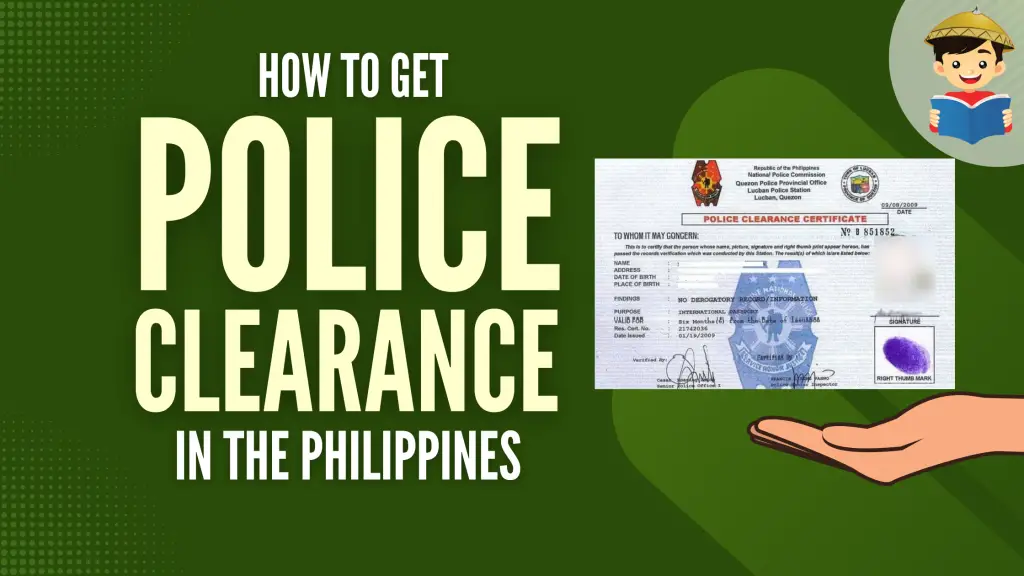
Whether you’re applying for the civil service exam or completing requirements for your new job, odds are you’ll be asked to apply for police clearance.
This definitive guide provides everything you need to know to get a police clearance in the Philippines most quickly and efficiently.
Table of Contents
What Is a Police Clearance?
Police clearance is one of the essential documents requested by a government agency or an employer to ensure that the applicant has no criminal record.
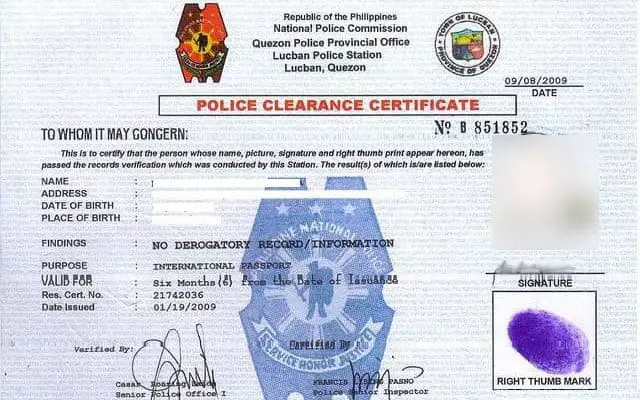
Just like the NBI, the Philippine National Police (PNP) now has a national database or a “centralized” system3. Known as the National Police Clearance System (NPCS), this merges all records from different towns and cities into one unified database, so checking/verifying criminal records is now easier than ever. This recent development eliminates the need to choose between police clearance from a place of work or residence since the applicant’s records can easily be retrieved at any police station.
Aside from employment, you may also need a police clearance whenever you apply for the annual civil service exam, register your firearms, apply for a credit card, or apply for various government-issued documents like your birth certificate.
On the other hand, police clearance is not honored for Philippine passport application/renewal and COMELEC voter registration.
For the policemen, however, clearance has a higher purpose.
Fugitives who have been hiding for years sometimes resurface to get a job. Thinking that the police have forgotten about their crimes, they apply for police clearance, not realizing that they’re turning themselves in by doing so. Since the rollout of the online police clearance application system, some 294 wanted personalities have been arrested, 4.2 million police clearances have been issued, and over 619 million pesos in government revenue have been generated4.
Types of Police Clearance in the Philippines
Although the data in the National Police Clearance System is much more comprehensive, online appointments to obtain police clearance remain limited to select police stations in the country. This is because not all employers require an all-encompassing criminal records check that can be completed with NBI clearance.
Therefore, ensure that you check with your employer or requesting authority which one of these two types of police clearance they need:
- National Police Clearance (NPC) – This police clearance is similar to NBI clearance in scope. It uses a national database to verify if the individual has an existing record in the city or municipality where he lives and anywhere in the Philippines. Although comprehensive, this police clearance requires an online appointment, and the police stations issuing it are only limited to a select few.
- Local Police Clearance (LPC) – is the police clearance we’re all familiar with and probably applied for several times before the launch of the online appointment system. Obtaining this clearance requires you to personally go to your municipal hall with your Barangay Clearance and apply for it the traditional way. Compared to NPC, the coverage of the LPC is more limited. It only checks if the applicant has a criminal history in his/her municipality, making it a standard requirement for people seeking employment within the same area.
What Is the Difference Between Police Clearance and NBI Clearance?
The Philippine National Police (PNP), responsible for issuing police clearances, launched the National Police Clearance System (NPCS) in 2018. Similar to the one used by the NBI, the NPCS is a centralized database containing all records/cases from different towns and cities nationwide.
Although it aims to one day replace the NBI clearance system altogether5, the PNP reveals the two clearances will remain separate from each other for now.
Now that the two clearances have nationwide coverage, their main difference lies in dealing with a “HIT” on an applicant’s records and the type of information they keep in their respective databases.
Note that the “cases” we’re discussing here only refer to criminal cases. The NBI and police clearance don’t cover civil cases or private disputes between individuals and organizations.
How Long Is the Validity of Police Clearance?
The new National Police Clearance is now issued as a single certificate only. It has a validity of 6 months and has a QR code that you can use to verify its authenticity.
Police Clearance Requirements
You must present at least two valid IDs to the police station on the day of your appointment. The IDs are for verification purposes, so they must be original (not photocopied), not expired, and have your photo, complete name, and signature.
The following valid IDs are honored by PNP:
- AFP ID
- BFP ID
- GSIS UMID
- LTO Driver’s License
- PRC ID/License
- School ID with the registration form
- IBP ID
- PCG ID
- BJMP ID
- Marina ID
- Pag-IBIG ID
- OFW ID
- Alien Certificate of Registration
- Birth certificate
- Passport
- SSS ID/UMID
- TIN ID
- PWD ID
- Voter’s ID
- PhilHealth ID
- PNP ID
- Postal ID
- Senior citizen ID
If you only have one of the valid IDs above, you can bring it with a certified true copy of your birth certificate from PSA (with the original official receipt attached).
If you’ve indicated in your online registration form (more on this later) that you’re a PWD, please bring your PWD ID for verification on the day of your appointment.
If you’re a fresh graduate who wants free police clearance, please also bring and present your First Time Job Seeker Barangay Certificate.
Is Personal Appearance Required?
Yes, personal appearance is required whether you’re applying for a National or Local Police Clearance.
While the police may have digitized records of the applicants, personal information and appearance change over time. Hence, it would be best if you show up to update these records with your recent photo and biometrics AFTER securing an appointment online via the National Police Clearance System (more on this later). If you’re applying for a Local Police Clearance, you can proceed to the municipal hall without securing an online appointment.
Note: The PNP also requires personal appearance partly to lure wanted criminals who are stupid enough to apply.
How Much Does a Police Clearance Cost?
If you’re applying for the new National Police Clearance via the NPCS website (see the succeeding steps), you’ll be paying a total of PHP 160 (PHP 150 police clearance fee + PHP 10 transaction fee) through Landbank or Bancnet.
This fee is waived for fresh graduates looking for their first job, provided they present a Barangay Certificate proving they’re qualified to avail of this benefit under the First Time Jobseekers Assistance Act.
Are Barangay Clearance and Cedula Needed for Police Clearance?
For those applying for the National Police Clearance, barangay clearance and cedula are no longer needed. Under the new guidelines, the only valid IDs honored by the PNP for police clearance applications are the ones listed above.
However, if you’re applying for the Local Police Clearance, which doesn’t require an online appointment, you will still need to secure a barangay clearance and cedula.
In addition, if you’re a first-time job seeker who wants to avail of police clearance for free (courtesy of the First Time Jobseekers Assistance Act6), you need to obtain a Barangay Certification stating that you’re a first-time job seeker and has been a resident of your barangay for at least six months. You also need to execute an Oath of Undertaking before the Barangay Chairman. Please check out this related guide for more information about this benefit and the templates you need to follow.
You may avail of the free police clearance only once. This benefit will be valid for up to one year from the date of issuance of the Barangay Certification.
Can I Get Police Clearance Through a Walk-In Application?
Yes, you can go straight to the municipal hall of the municipality where you live and apply for a Local Police Clearance without needing an online appointment. However, this police clearance only checks for criminal records within the same municipality.
If your employer requires a National Police Clearance with nationwide coverage, you must secure an online appointment before going to your preferred police station. The problem, however, is that not all police stations are included in the online appointment system. Suppose you try the online appointment system (as discussed in detail in the next section) and can’t find your nearest municipal/city/local police station on the list. In that case, chances are they are issuing Local Police Clearances only.
Where To Get Police Clearance in the Philippines
The Local Police Clearance can be easily obtained from the municipal/city hall with jurisdiction over your residence. No online appointment is required.
On the other hand, if you use the NPCS website to set an appointment for your National Police Clearance application, your choices will be limited to the police stations/police camps available in the system. You’ll most likely choose the one nearest to you.
As part of the PNP’s strategy to decongest police camps across the country and to make police services more accessible to people, it was recently announced that PNP National Police Clearance booths would soon be available in SM malls nationwide7. This means police clearances will be easier to obtain as the application, processing, and release can now be completed at a more convenient venue.
How To Apply for a Police Clearance Online in the Philippines: 11 Steps
The National Police Clearance System (NPCS) was launched in 2018 to help PNP streamline the process of checking criminal records. This innovation allows applicants to apply online for a National Police Clearance anytime and anywhere.
What used to take an average of 30 minutes in police stations can now be completed in less than 10 minutes, thanks to the bulk of the application procedure that can now be completed online.
Personal appearance is still required as the PNP needs to update its database with the applicants’ photos and fingerprints.
Are you ready to give the NPCS a try? Follow the steps/procedures as follows:
1. Access the NPCS Website To Register
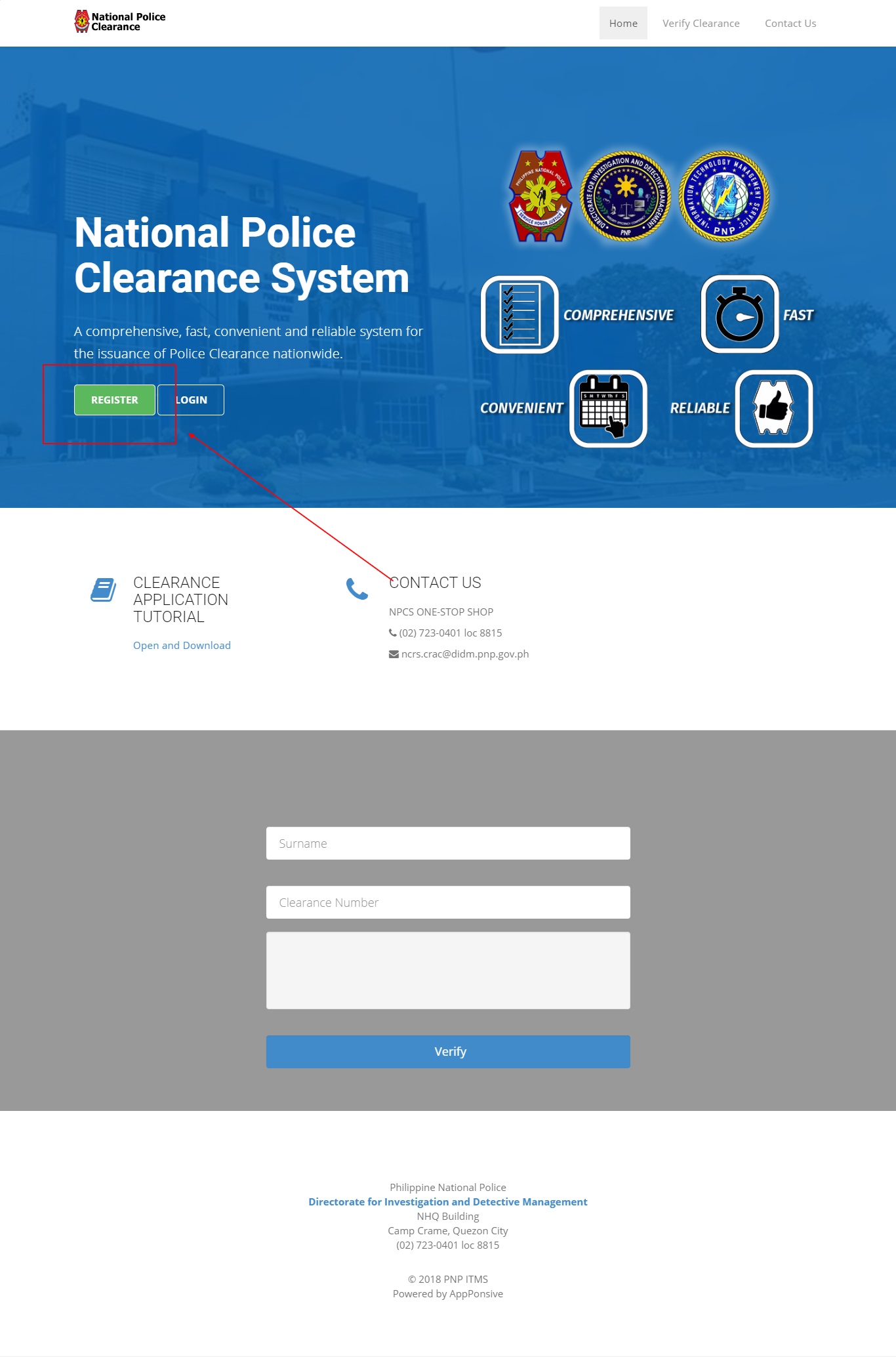
First-time applicants are required to register with the National Police Clearance System website.
On the NPCS home page, click Register.
A pop-up box will show up on your screen.
Select your preferred language (i.e., English, Filipino, or Cebuano).
Tick the corresponding boxes to agree with the Service Agreement, Privacy Policy, and other reminders.
Finally, click I Agree to continue.
2. Fill Out the “New Applicant Registration” Form
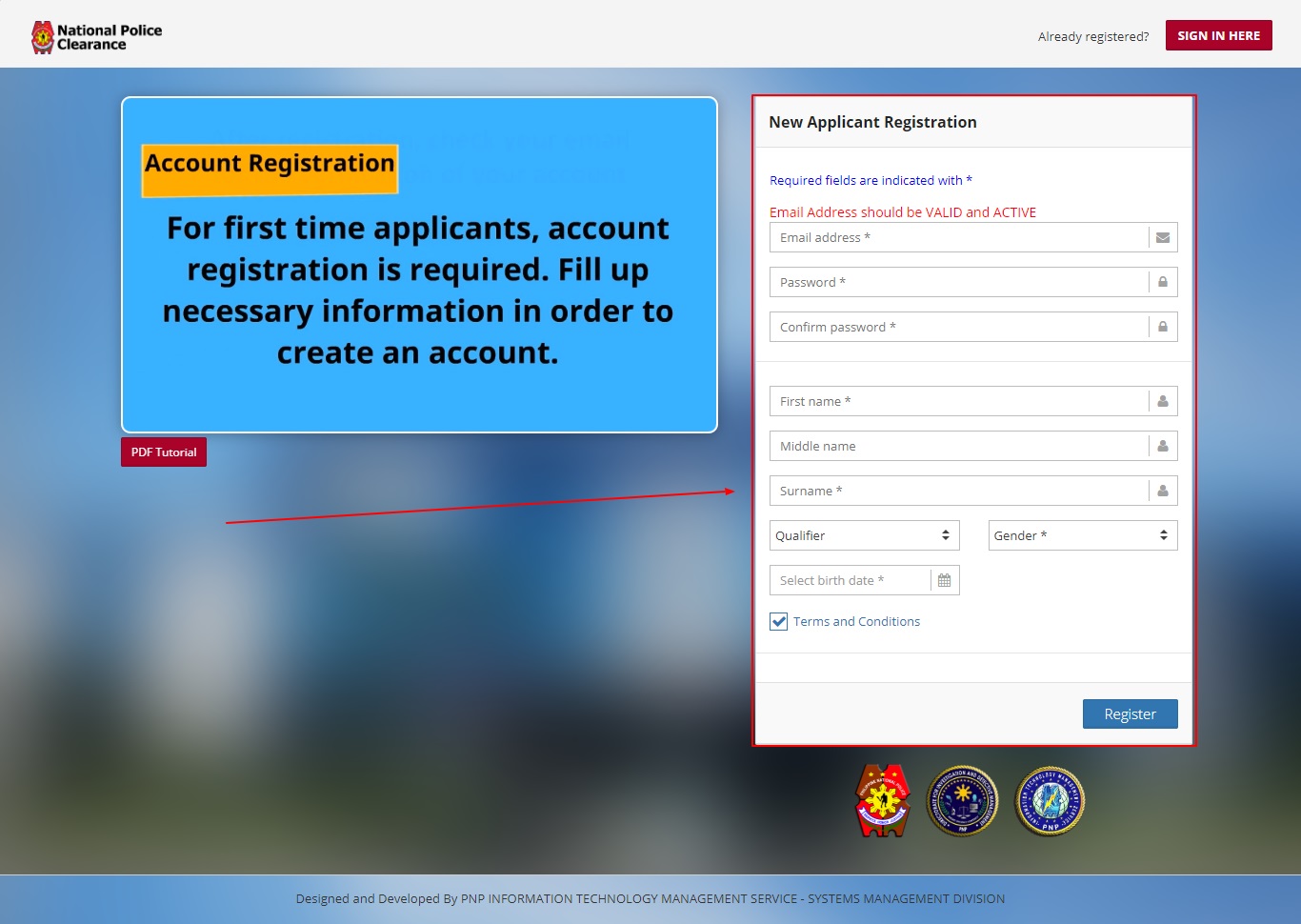
To create an account, complete the “New Applicant Registration” form with your email address and password, name, gender, and birth date.
Tick the box for “Terms and Conditions” and then click Register.
A warning box will then remind you to check your provided information before proceeding. If you’re sure about it, click Save. Otherwise, click Cancel.
3. Log In to Your Account
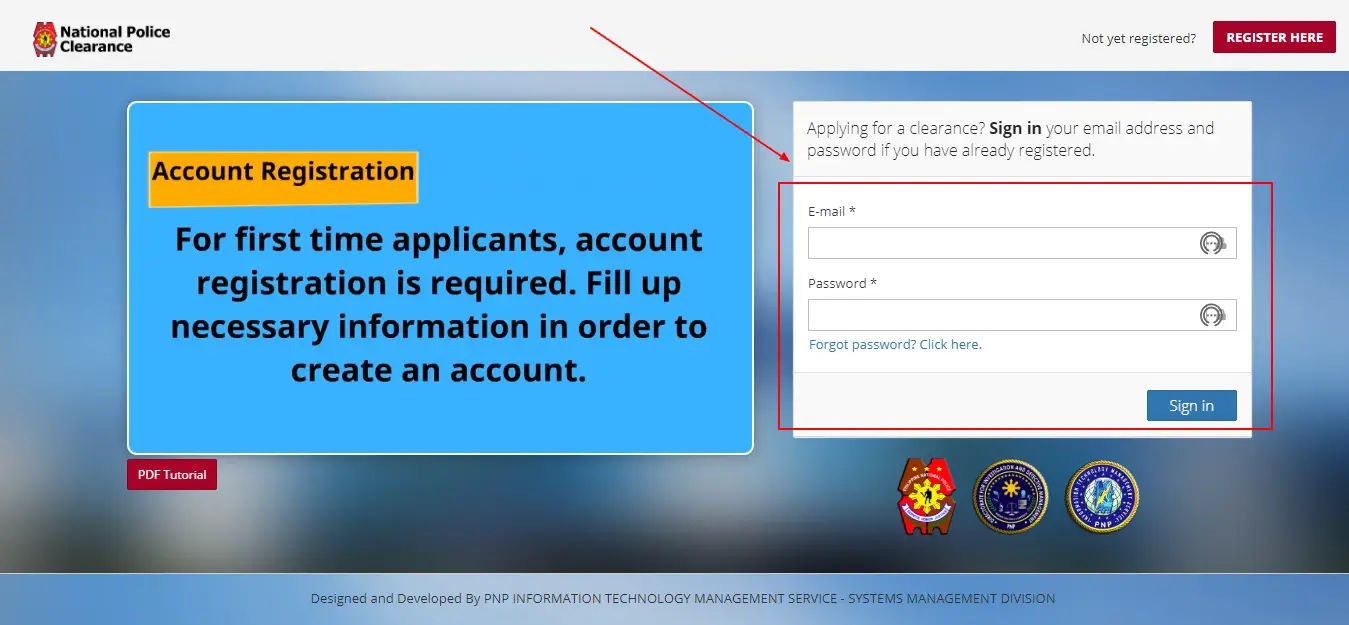
Sign in using the same email address and password you provided during registration.
4. Click on “Edit Profile”
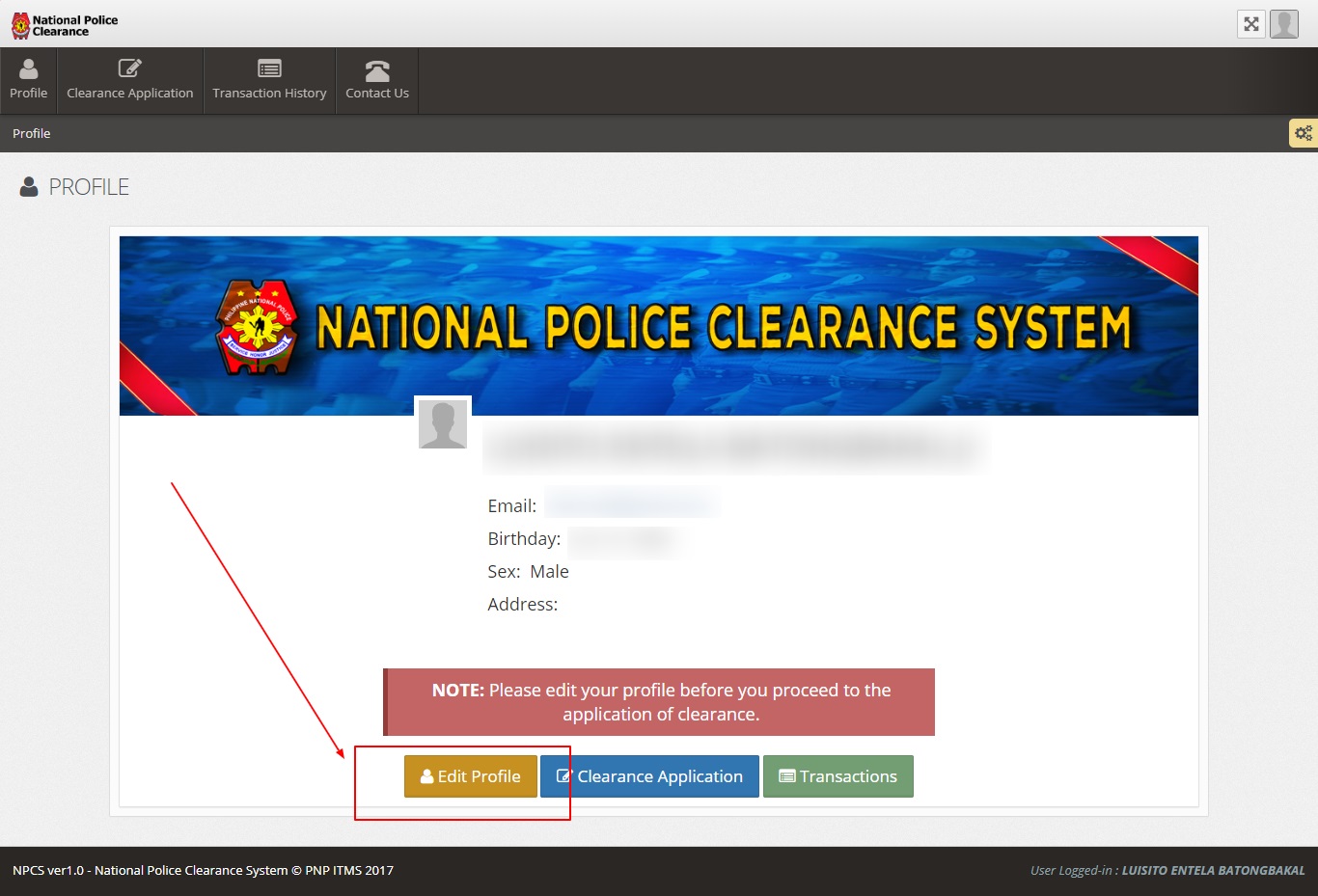
Inside your NPCS account, click on Edit Profile.
5. Fill Out the “Applicant Information” Form
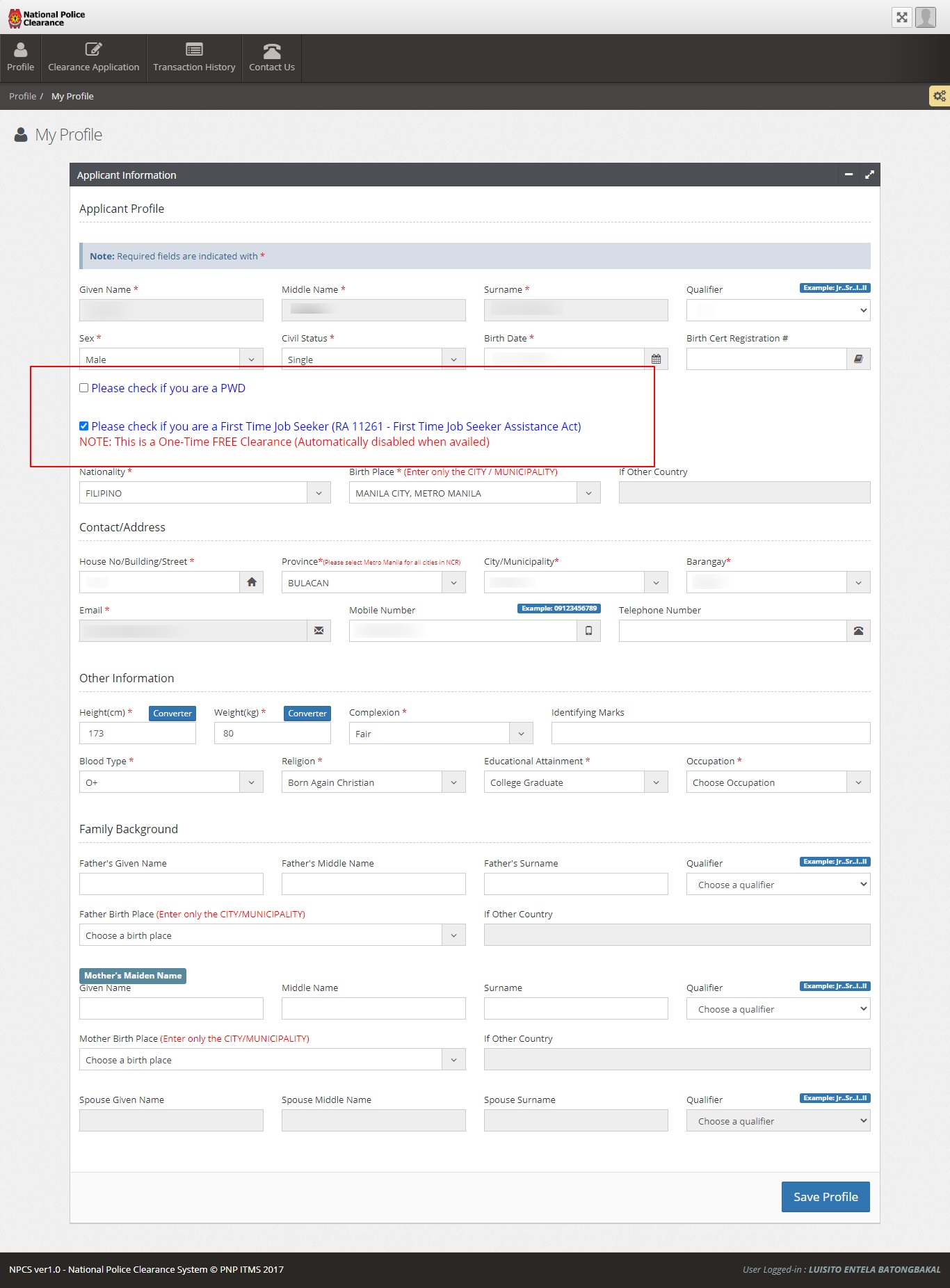
Supply information to all the required sections in your Applicant Profile that haven’t been filled out yet, like Nationality, Birth Place, Civil Status, Address, Mobile/Telephone Number, Height, Weight, Complexion, Educational Attainment, and Family Background.
For PWD applicants, mark the checkbox “Please check if you are a PWD” and provide your PWD ID number.
If you’re a fresh graduate looking for your first job, mark the “Please check if you are a First Time Job Seeker ” (RA 11261 – First Time Job Seeker Assistance Act)”. Doing so will waive the police clearance fee as the law now enables first-time jobseekers to avail of government-issued documents for free, provided they can present a Barangay Certificate as proof of their qualification8.
Take note that qualified applicants can only avail of free police clearance ONCE.
Review all the information you’ve provided and check for missing data or spelling mistakes. Whatever information you provide will be shown on the printed police clearance so that any erroneous entry will be due to the applicant’s fault and not the PNP’s.
Once you’re done, click Save Profile.
6. Click the “Clearance Application” Button
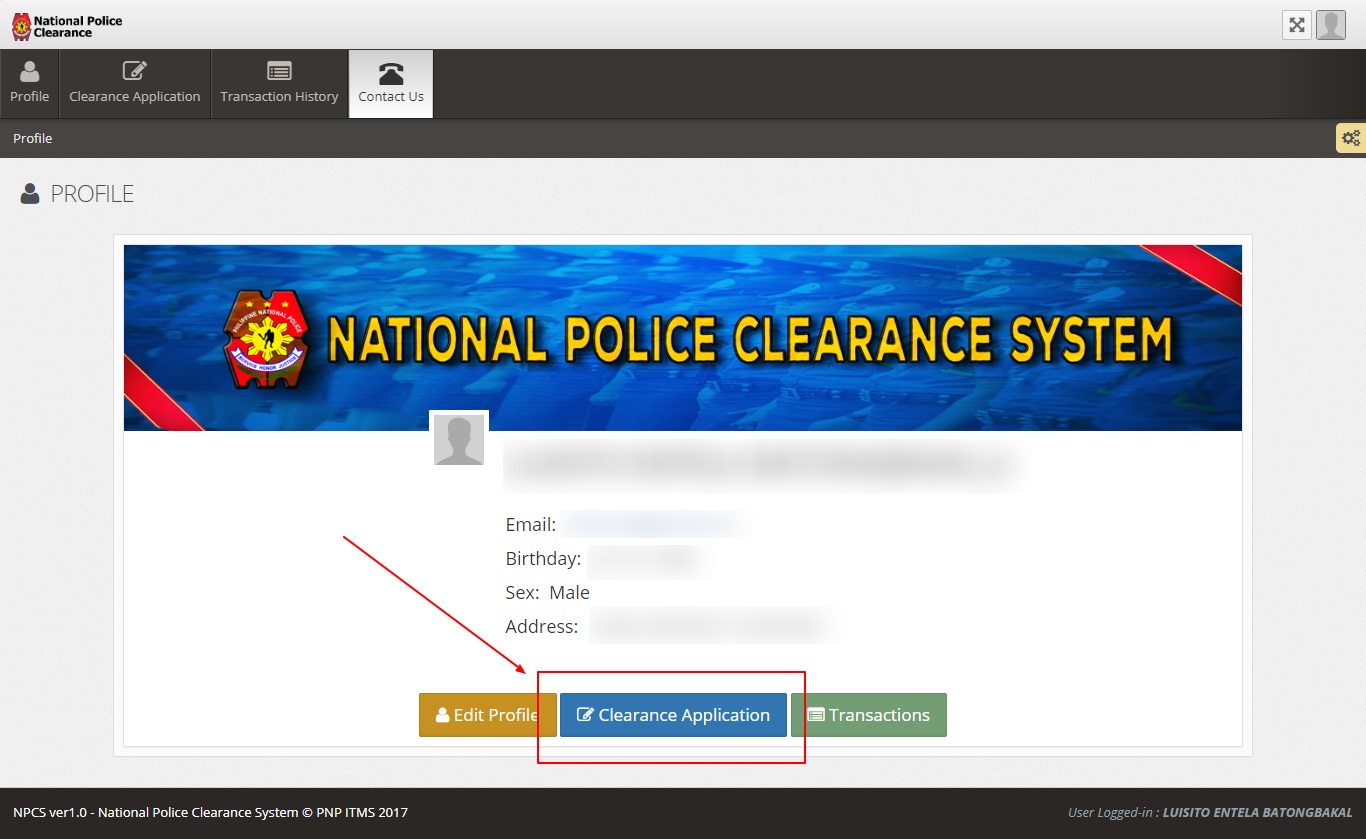
You must select this to set an appointment with the nearest police station online.
7. Set an Appointment
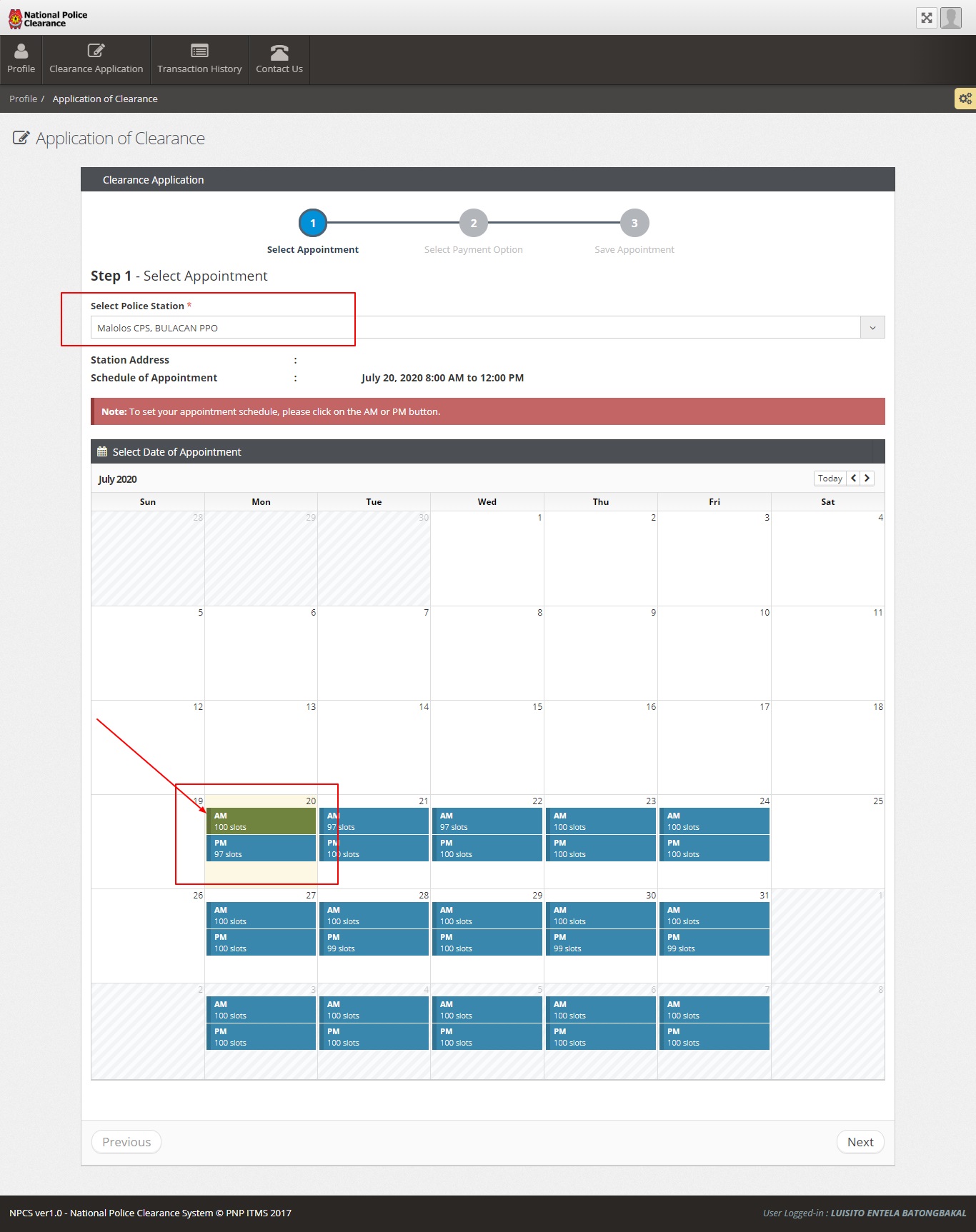
Select your preferred Police Station from the drop-down list provided.
Choose your preferred date and either AM or PM schedule from the list of available dates.
Click Next.
8. Select Payment Option
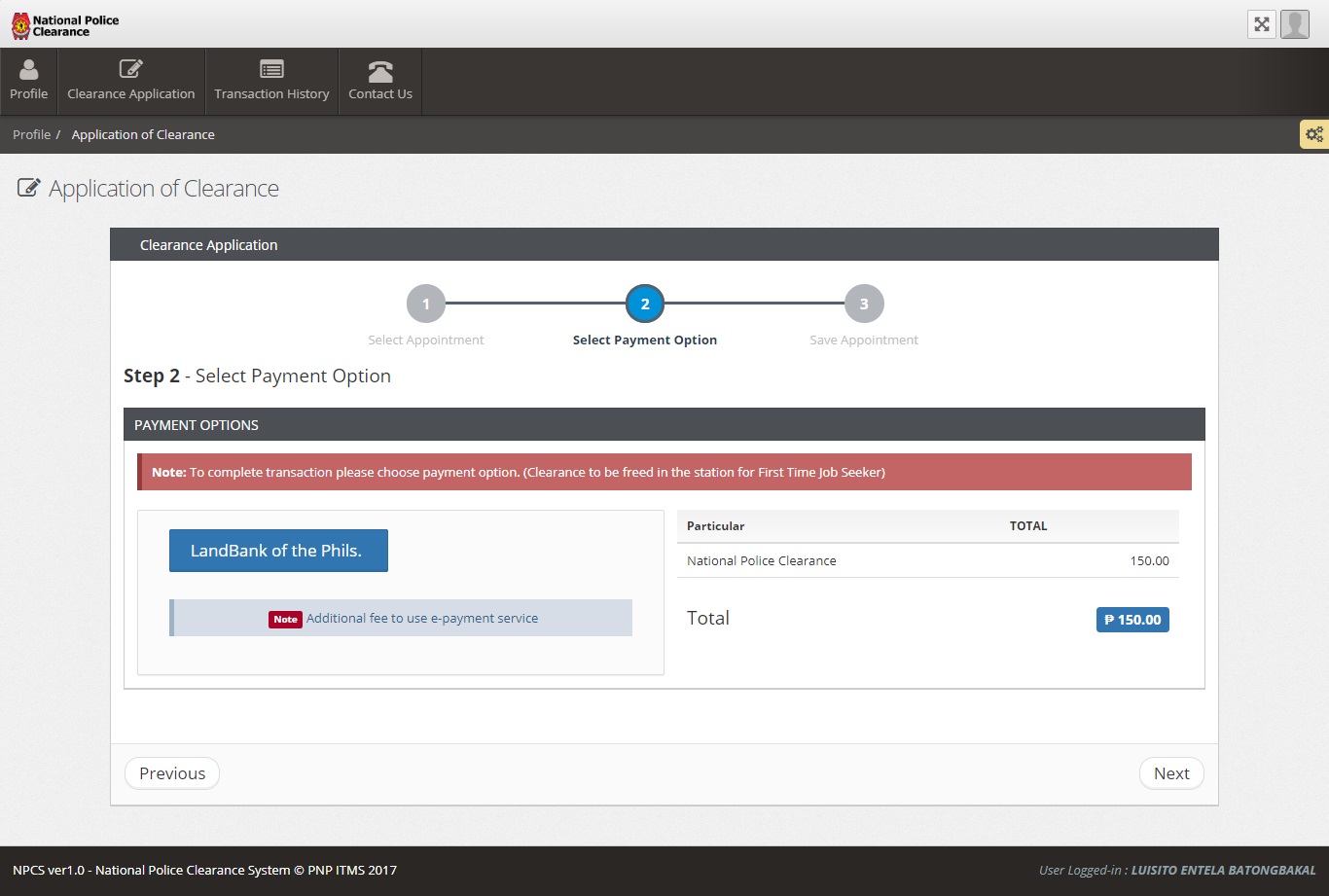
Select “LandBank of the Phils.” under Payment Options. It will then show the police clearance fee of Php 150 that you need to pay to secure your appointment. For first-time jobseekers, the fee will be waived at the police station on the day of your appointment.
Click Next.
9. Review the Notes/Reminders and Pay the Police Clearance Fee
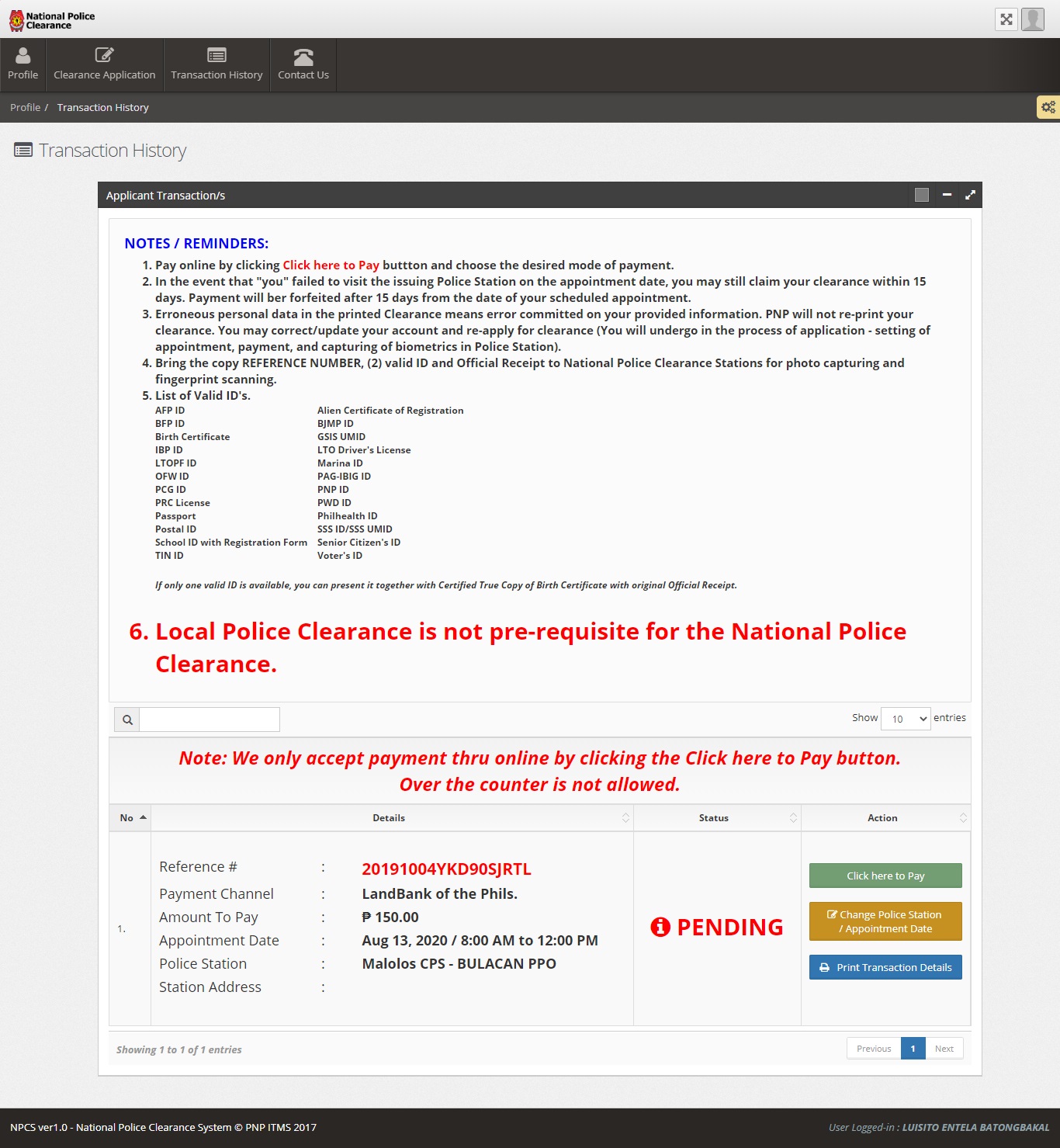
The following page contains your transaction summary, including your chosen police station, appointment scheduling, payment option, and instructions on what to do next.
After reviewing the information, click Save Appointment.
Save or note the reference number that will be displayed on the page.
Pay the police clearance fee by clicking the Click here to Pay button on the bottom right corner of the page. Take note that over-the-counter payment at the police station is not allowed.
You’ll be directed to the LandBank of the Philippines ePayment portal. Select either LandBank or Bancnet (for those with non-LandBank accounts) as your preferred payment option. Enter your account number and PIN to complete the transaction.
If you don’t have a bank account, you can also pay the police clearance fee over the counter at the nearest 7-Eleven convenience store.
You can also pay the fee via GCash. To pay the police clearance fee using your GCash account, enter your GCash number on the LandBank of the Philippines ePayment portal. The transaction details and payment summary will be subsequently shown.
Make sure to complete the payment at least two banking days before your appointment date, or else your transaction will be canceled.
For first-time job seekers, there is no need to proceed with the payment. Just go directly to the police station on the day of your appointment and present your First Time Job Seeker Barangay Certificate.
10. Proceed to Your Chosen Police Station for Photo Capture and Biometrics
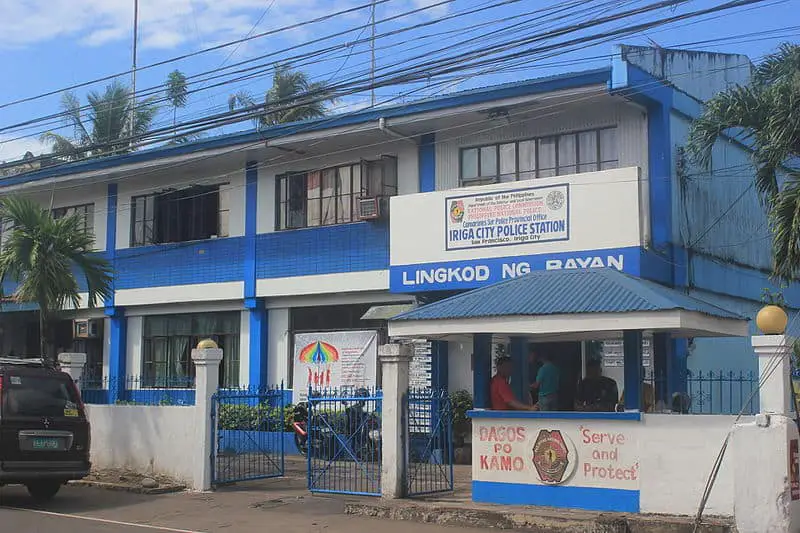
Show the Official Receipt, 2 valid IDs, and a copy of your payment Reference Number to the Clearance Police Non-Commissioned Officer (PNCO).
You will be guided to the designated area where your photo, fingerprints, and digital signature will be taken.
Afterward, your application will go through a verification process.
Since all police stations are now connected to a centralized PNP database, the process should not take long. If it does, it only means you have a “HIT” (most probably due to a namesake) on your police clearance.
Unlike NBI clearance “HIT,” a “HIT” on a police clearance can be resolved within a few minutes as long as you’re not involved in any crime and don’t have an active arrest warrant.
11. Wait for Your Police Clearance To Be Released
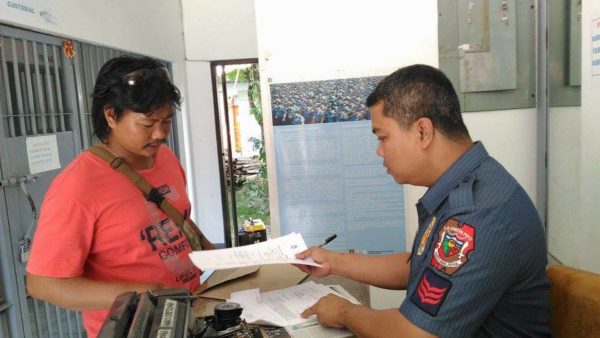
Unlike other government-issued documents, police clearances are released on the same day of application. Depending on the police station, getting a police clearance may take 15 minutes or more.
Once the verification process is complete, you can wait for your name to be called for the release of your police clearance.
The process is simple and fast, so there’s no reason for anyone to go to lengths to falsify it.
Anyone who is caught using a falsified document will be facing a “penalty of prison correctional in its medium and maximum periods and a fine of not more than Php 5,000” 9.
Tips and Warnings
1. A missed appointment doesn’t automatically cancel your police clearance application
If you fail to show up on your appointment date, you will be given another 15 days to go to your chosen Police Station to claim your police clearance. Your payment will be forfeited beyond this 15-day grace period, and you must re-apply.
Update (October 2, 2021): One of our readers recently shared her experience of being unable to attend her scheduled appointment due to lockdown restrictions. Surprisingly, she logged in to her account and moved the appointment date to a new one without paying any extra fee.
2. You can no longer edit or change erroneous personal data on your police clearance once it’s already printed
To correct or update any information on your printed police clearance, you must re-apply online, make the necessary changes, secure another appointment, pay the fee, and return to the same police station for biometrics capturing.
3. You can verify the authenticity of your police clearance online
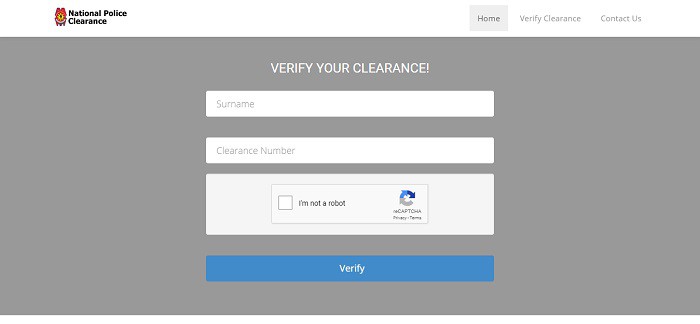
To confirm your police clearance is legit, go to the NPCS website and choose “Verify Clearance” from the main menu.
Enter your surname and police clearance number. Tick the box for the captcha to prove you’re human and click Verify.
4. Police clearance applications are only accommodated during weekdays
The online appointment system will show you that no slots are available for Saturday or Sunday. Applicants can choose from AM or PM schedules on a weekday, Monday to Friday.
Therefore, it’s better to schedule an appointment to choose a schedule that falls on a weekday, preferably during your rest day.
5. Police clearance can’t be renewed once it expires
Unlike NBI clearance, police clearance can’t be renewed, so you must apply for a new one after it expires. Police clearances in the Philippines are only valid for 6 months from release.
Frequently Asked Questions
1. I’m applying for work/immigration abroad. How can I authenticate my police clearance with DFA red ribbon?
You need to obtain an original copy of the police clearance issued by the Philippine National Police (PNP) and follow the updated procedure to Apostillize it (the red ribbon has already been replaced by Apostille certificate since June 17, 2019).
2. What is the difference between NBI clearance and police clearance?
The NBI clearance and National Police Clearance used to differ in scope. While the former uses a national database to identify criminal cases filed in courts anywhere in the country, the latter could only identify cases filed in the specific town or city where it’s issued.
However, with the launch of the National Police Clearance System (NPCS) in 2018, the line between the two clearances has been blurred. The NPCS has enabled the Philippine National Police (PNP) to merge all records from different towns and cities into one database.
This centralized database, similar to the one used by the NBI, has streamlined the process of checking/verifying criminal records in any police station in the Philippines. The NPCS database will also be integrated into the National ID System.
Nonetheless, the PNP has clarified that the National Police Clearance System will NOT replace the NBI Clearance System. But with both of them having nationwide coverage, what makes them different?
The difference lies in how the two agencies process a “HIT” on an applicant’s records. As you may already know, a “HIT” is when an applicant’s records return a suspicious result. In most cases, a “HIT” is caused by a namesake.
Whereas a “HIT” in NBI clearance usually takes up to 10 days to be verified and resolved, the same can be cleared immediately when applying for a police clearance. This is because local databases are now stored in one cloud so the police can quickly confirm whether the “HIT” comes from a namesake who was involved in a crime and has an active arrest warrant.
The NBI and PNP also differ in the types of information they gather and keep in their databases.
NBI is mandated by law to store more official records, which include the following:
a. Civilian identification records (e.g., identifying marks and characteristics)
b. Derogatory and criminal records
c. Facial photo
d. Fingerprint scan
e. Dental records (obtained with the help of the Philippine Dental Association)
PNP, meanwhile, keeps the following information about citizens included in its database:
a. Blotter records
b. Derogatory and criminal records
c. Facial photo
d. Fingerprint scan
3. I’m a Filipino/foreigner who lived in the Philippines but is now based in another country. How can I apply for a police clearance or certificate while abroad?
What other countries refer to as police clearance or certificate is equivalent to Philippine NBI clearance, a similar certificate with more comprehensive coverage. Even charges taken to court, including traffic violations that were later dismissed, can also appear on an NBI clearance.
In other words, if you’re required to obtain a police clearance from your country of nationality (i.e., the Philippines), you must get an NBI clearance.
Where to get a police clearance while abroad depends on whether your destination country requires police clearance from your current country of residence, country of nationality, or both.
For instance, the US State Department’s Foreign Affairs Manual10 explains that applicants who are 16 or older are required to submit a police certificate from his/her current country of residence where he/she has lived for more than 6 months. These same applicants are also required to present a police certificate from his/her country of nationality (if different from the country of current residence), where he/she also lived for more than 6 months.
In this case, the applicant must obtain two police certificates–one from the current country of residence and another from the country of nationality.
For example, suppose you’re an OFW who has been working in Saudi Arabia for many years and is now applying for an immigrant visa to the US. In that case, you must obtain a police certificate (or its counterpart) in Saudi Arabia. Since you’re originally from the Philippines before going to Saudi Arabia, you must apply for an NBI clearance (the Philippine equivalent of a police certificate).
Again, what other countries call a police certificate is the same as what Filipinos know as the NBI clearance.
Now that we’ve clarified the difference between a police certificate from your country of residence (for OFWs, this is the country where you currently stay or work) and police clearance from your country of nationality (i.e., the Philippines), let’s now discuss how to obtain the latter.
Getting an NBI clearance depends on whether the person applying for a permanent residence/immigrant visa currently resides in the Philippines or outside the Philippines11.
Getting an NBI clearance is relatively more straightforward in the Philippines. Follow the instructions in this guide, and you’ll get the NBI clearance exactly when you need it. If you’re abroad, on the other hand, you may still get an NBI clearance in the Philippines with or without an authorized representative. For more information, read this.
4. How can I pay the police clearance via 7-Eleven?
If you don’t have a bank account, paying the police clearance fee is still possible through 7-Eleven, which offers applicants a convenient way to make payment directly to the cashier so long as they have the pre-generated bar code from the CLiQQ mobile app. Let me show you how.
Step 1: Log In to Your NPCS Account With Your Registered Email Address and Password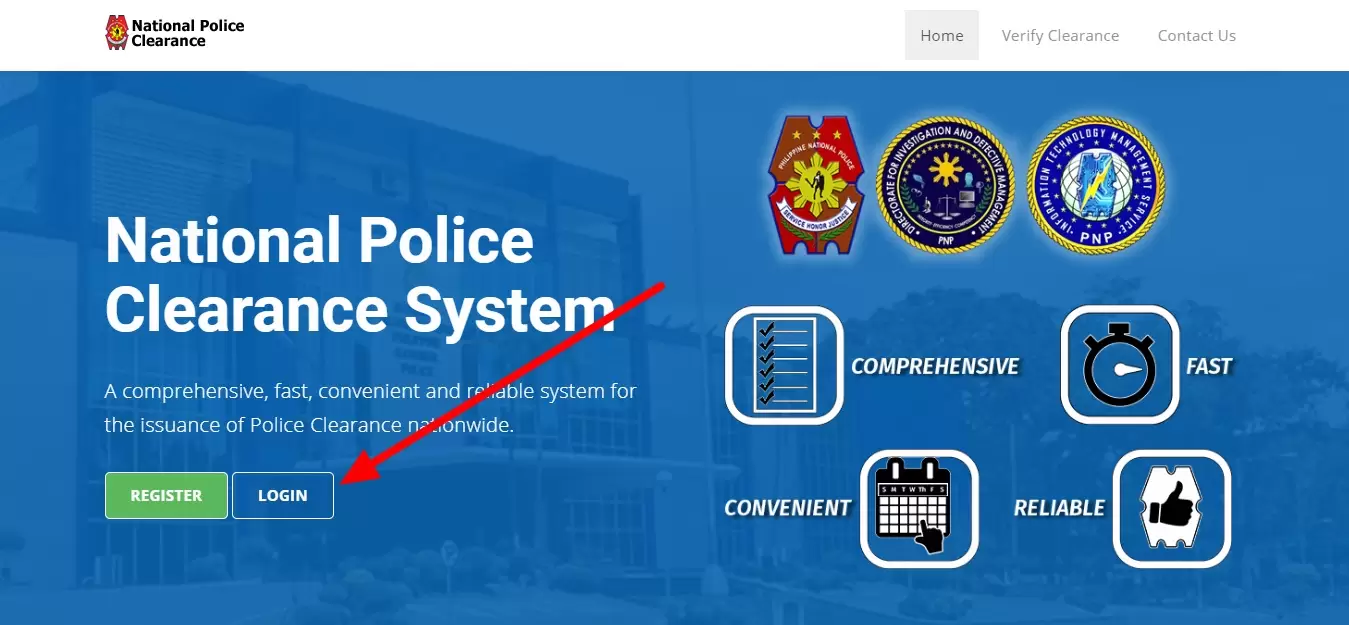
If you have already registered and created an online appointment, go to this page to log in. Otherwise, return to the guide above to create an account and choose your preferred appointment schedule and venue.
Step 2: Go To Transaction History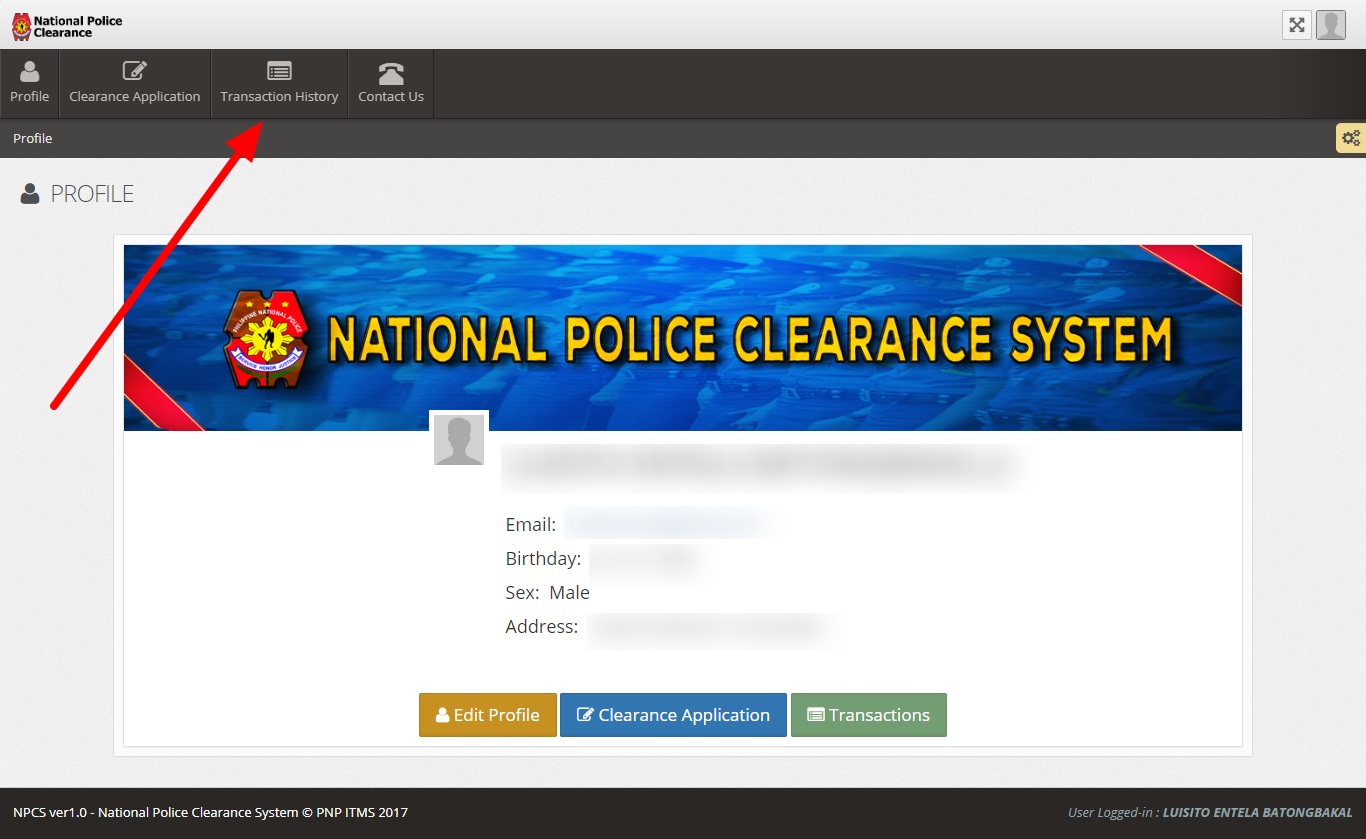
Since you’re already in the payment stage, all you need to do is click on Transaction History on the main menu to pick up where you left off.
Step 3: Select “Click here to pay”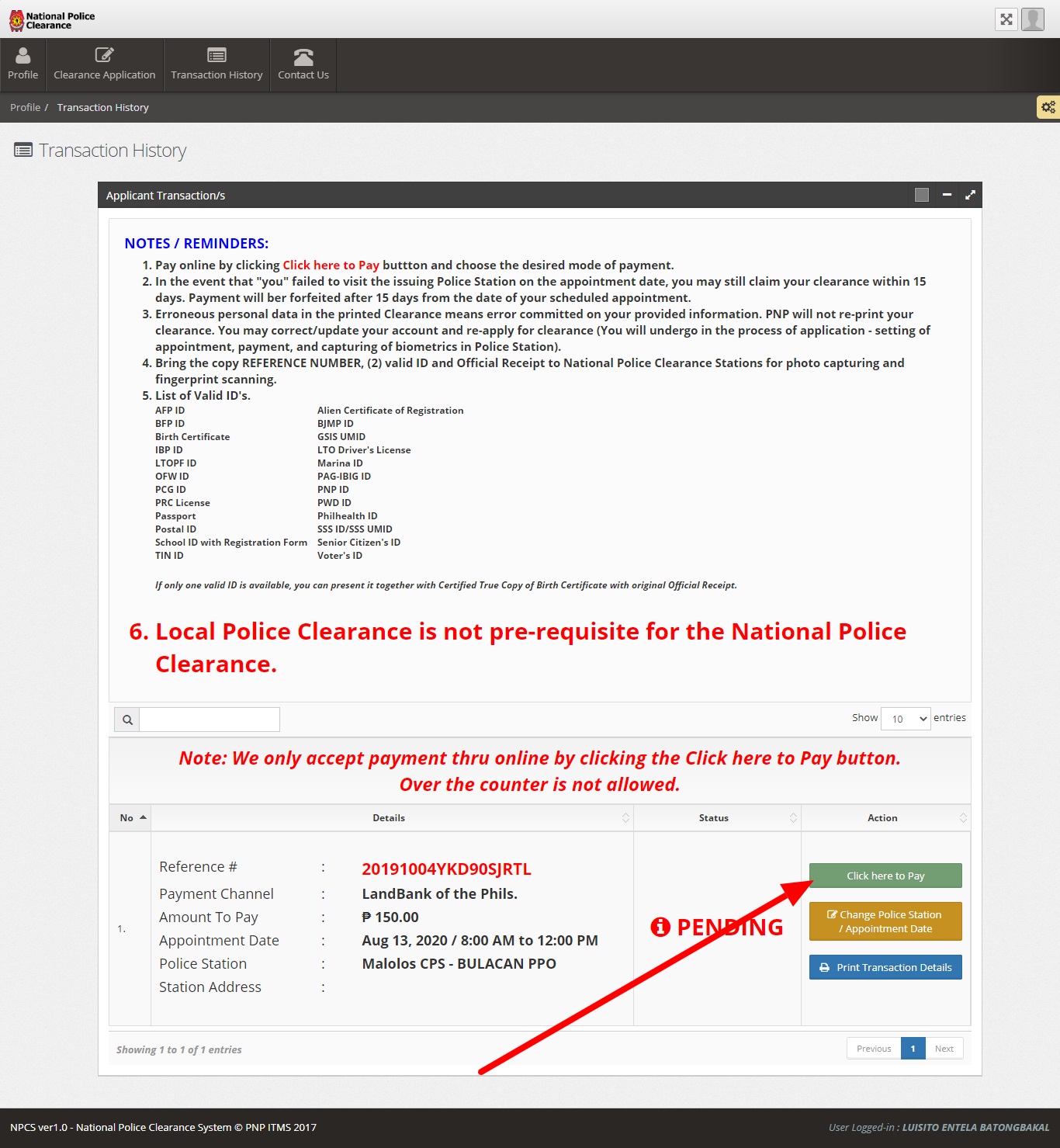
Before we proceed, there are two things I want to clarify.
First, the blinking reminder that says Over the counter is not allowed refers to the fact that you can’t make the payment at the police station on the day of your appointment. You can still pay over the counter through 7-Eleven.
Lastly, the reference number displayed on this page is ONLY needed if you’re going to pay online via LandBank. The reference number that you’ll need for the 7-Eleven payment is different, and you’ll get it later on as you proceed with the transaction.
However, you must still save or keep the reference number showing because the police station will ask for it for verification on the day of your appointment.
Step 4: Choose “Cash Payment” As Your Payment Option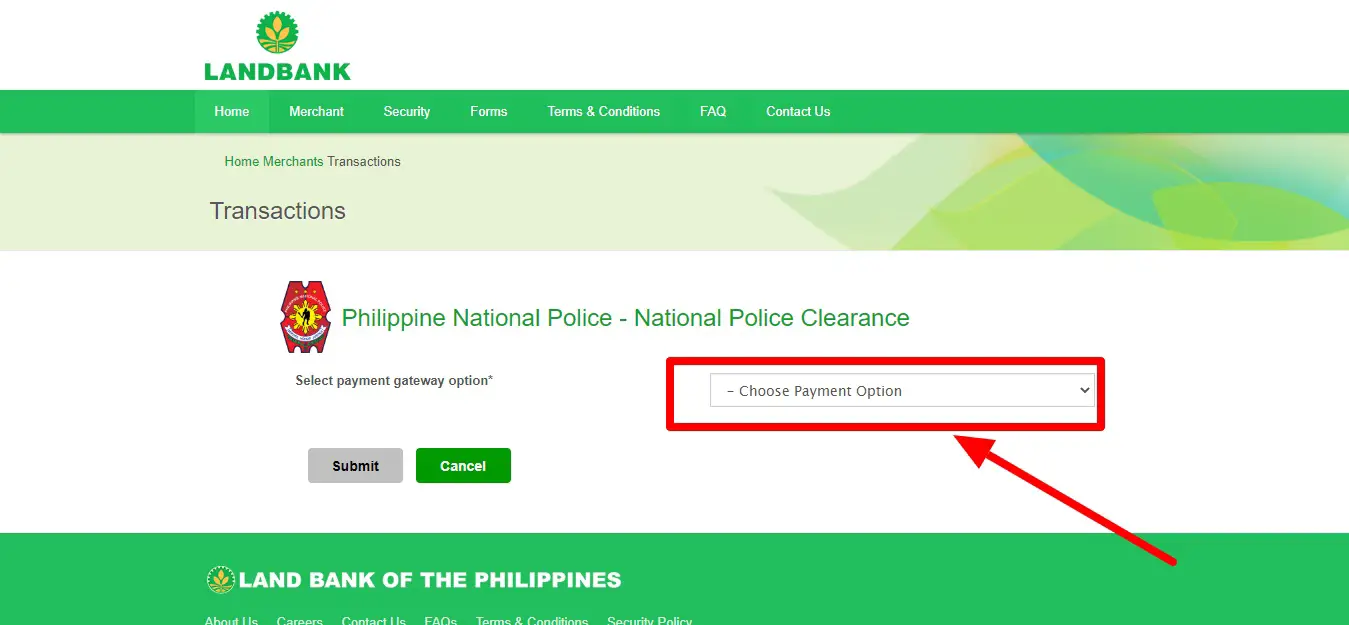
Upon landing on the LandBank of the Philippines ePayment portal, you’ll be asked to select your preferred payment gateway option from the drop-down list provided.
Select Cash Payment and then click Submit.
Step 5: Review the Transaction Details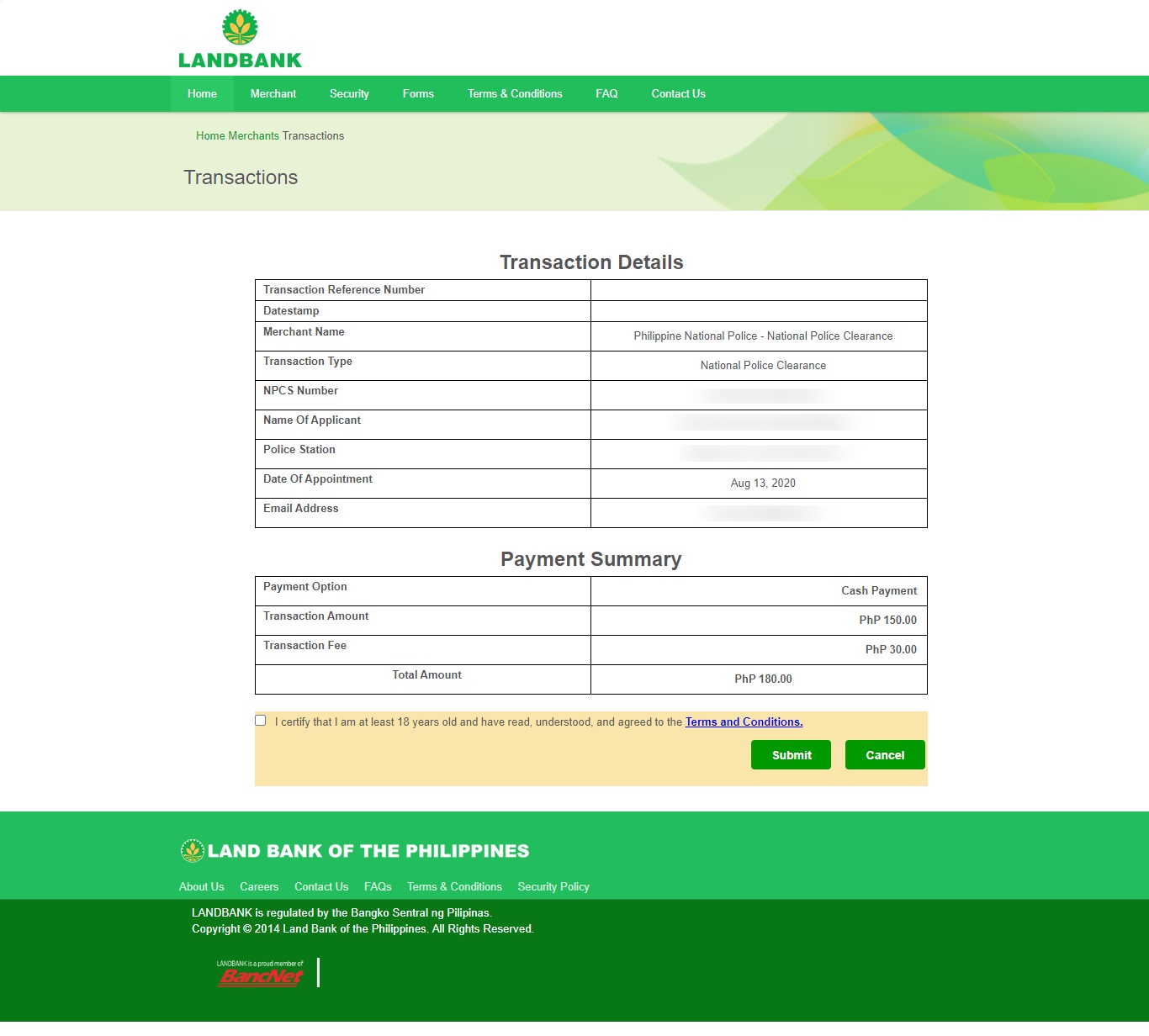
This is your opportunity to double-check if all your appointment details are correct. The total amount that will be charged to you will also be displayed. It includes the convenience fee of Php 30 on top of the police clearance fee of Php 150 for a total of Php 180.
Tick the box below to certify that you’ve read and agreed to the Terms and Conditions. Click Submit.
Step 6: Select 7-Eleven As Your Preferred Payment Channel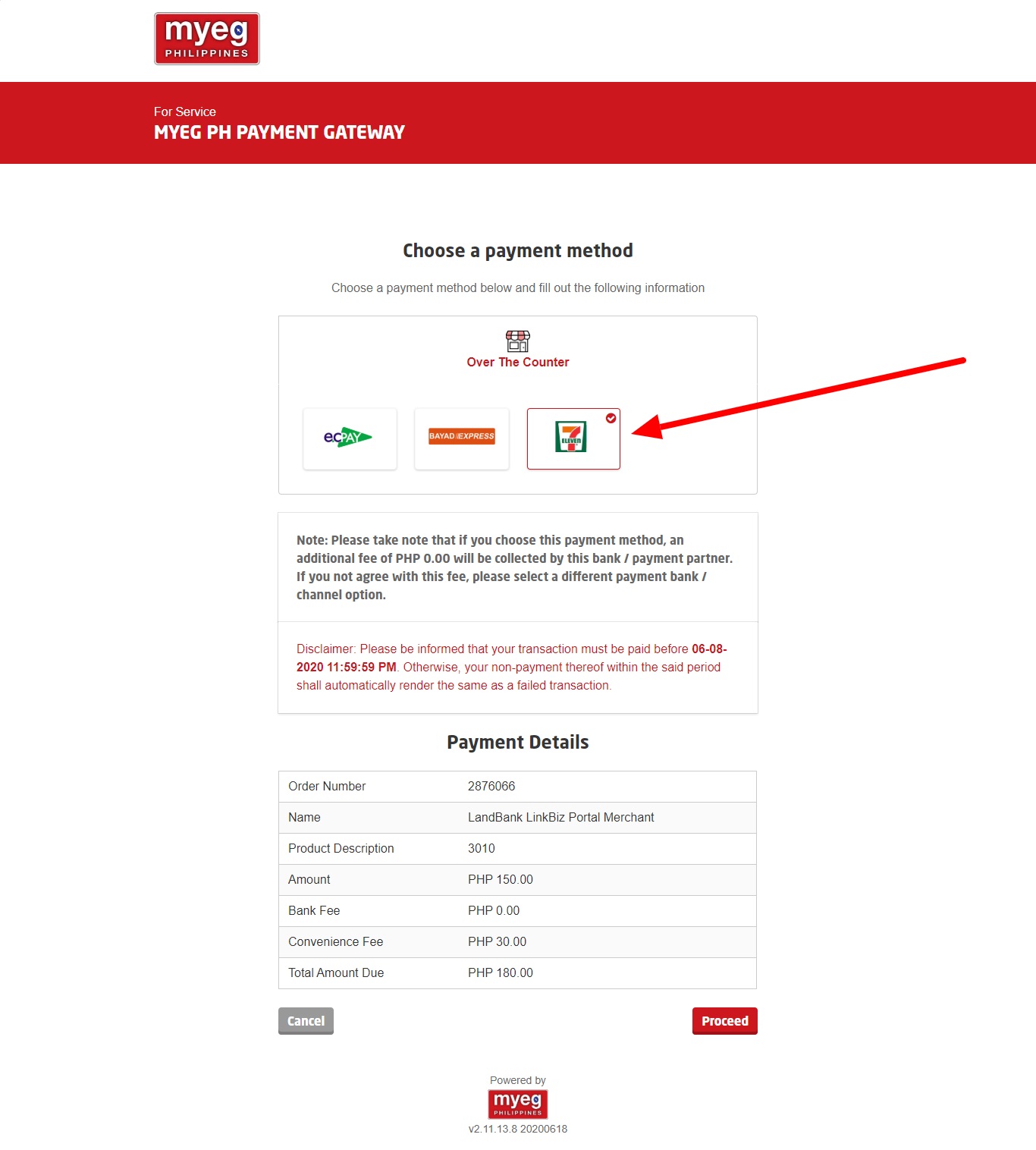
From the LandBank portal, you’ll be directed to the MyEG Philippines payment gateway, where you’ll be asked to choose your preferred payment method from ECPay, Bayad Express, or 7-Eleven.
Select 7-Eleven, taking note of the exact date and time when the payment is due. (Make sure to pay at 7-Eleven before this date; otherwise, the transaction will be invalid).
Review the Payment Details and click Proceed.
Step 7: Copy and Save Your Payment Reference Number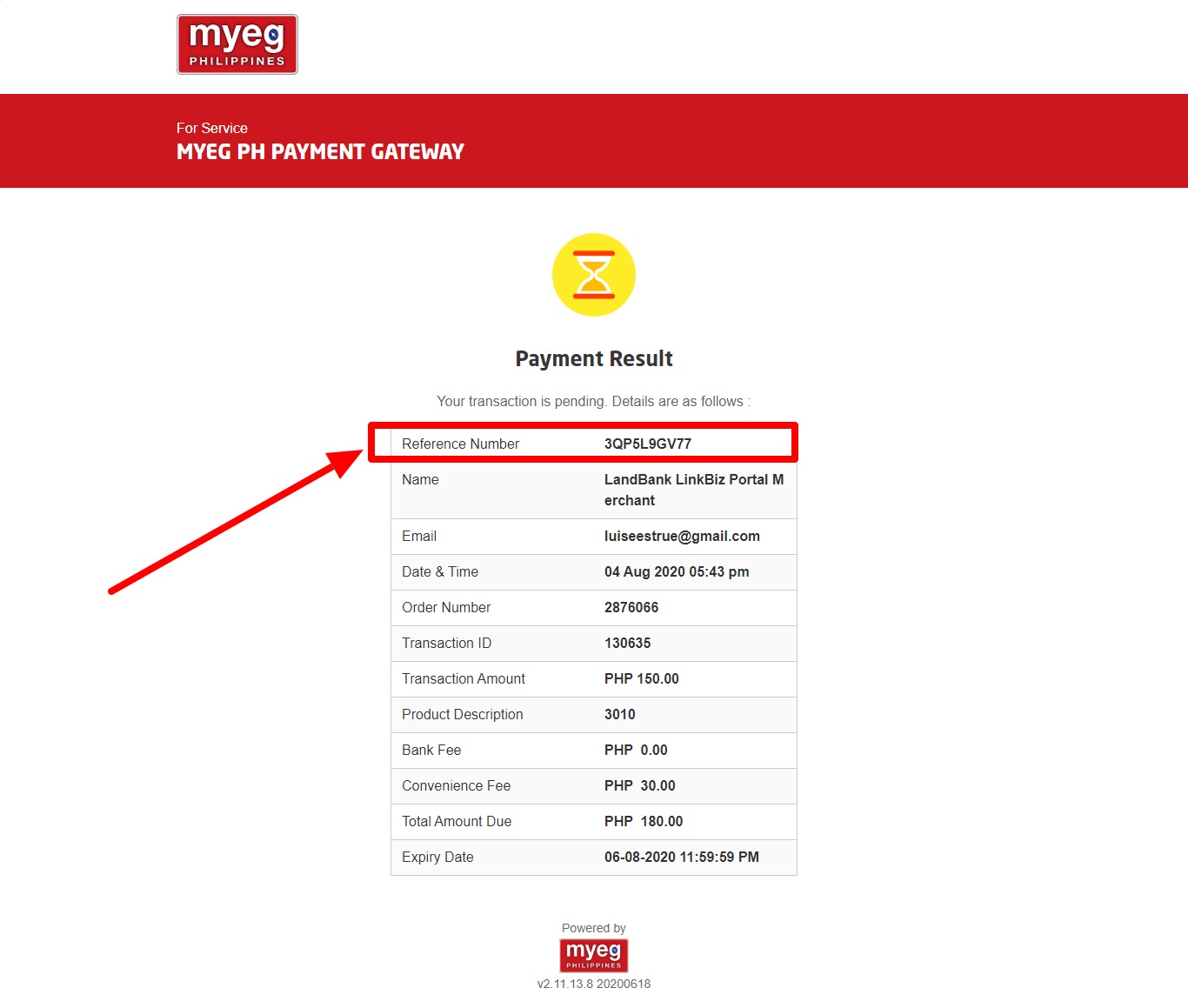
The Payment Result page will display a transaction summary, including the reference number you’ll need to pay at 7-Eleven.
This reference number contains 10 alphanumeric characters and is entirely different from the reference number in step 3. Whereas the former is required for the 7-Eleven payment, the latter will be presented to the police station on the day of your appointment for verification purposes.
Keep a copy or take a screenshot of the payment reference number.
Step 8: Install the CLiQQ Mobile App on Your Phone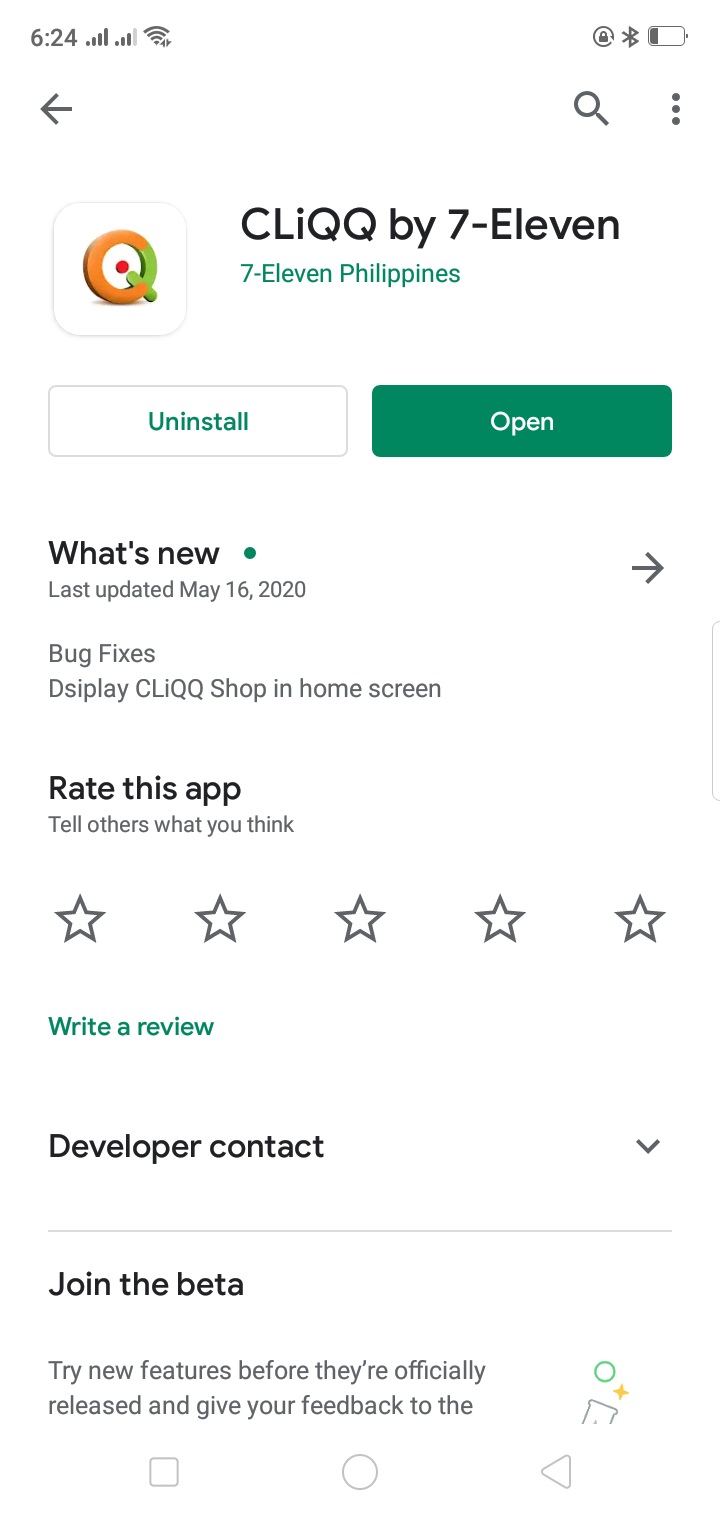
7-Eleven convenience stores have CLiQQ kiosks where you can personally pay your bills. However, last time I checked, the Bills Payment feature is only available to pay fees for NBI clearance and PRC transactions.
So, instead of going straight to 7-Eleven, download the CLiQQ mobile app first to generate the bar code needed for the police clearance fee payment.
Step 9: Open the CLiQQ App and Create an Account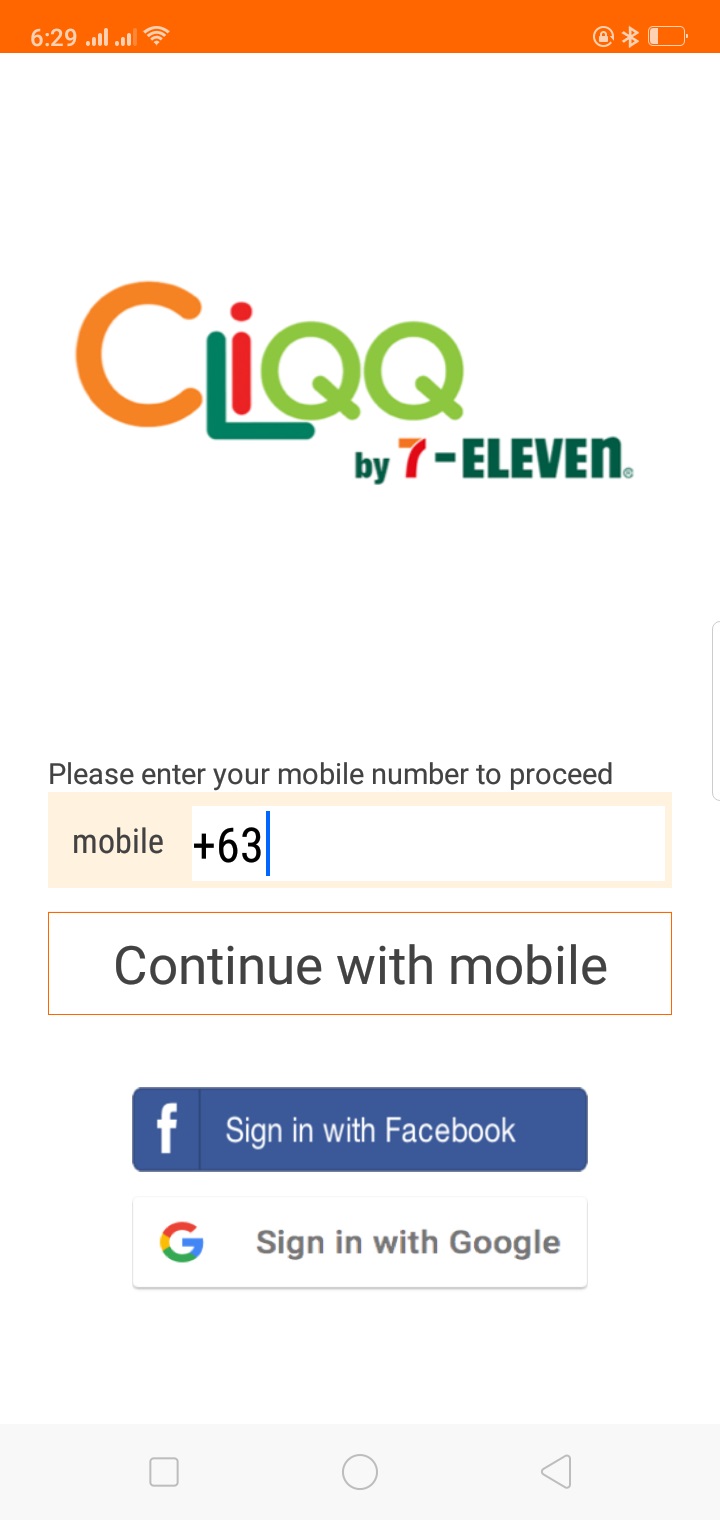
To register, enter your mobile number and click Continue with mobile. You can also register using your Facebook or Google account.
You’ll receive a 4-digit verification code via SMS if you register using your mobile number. Enter the verification code in the boxes provided.
Check the box to agree to the Terms and Conditions and to complete the registration.
Step 10: Select Pay Bills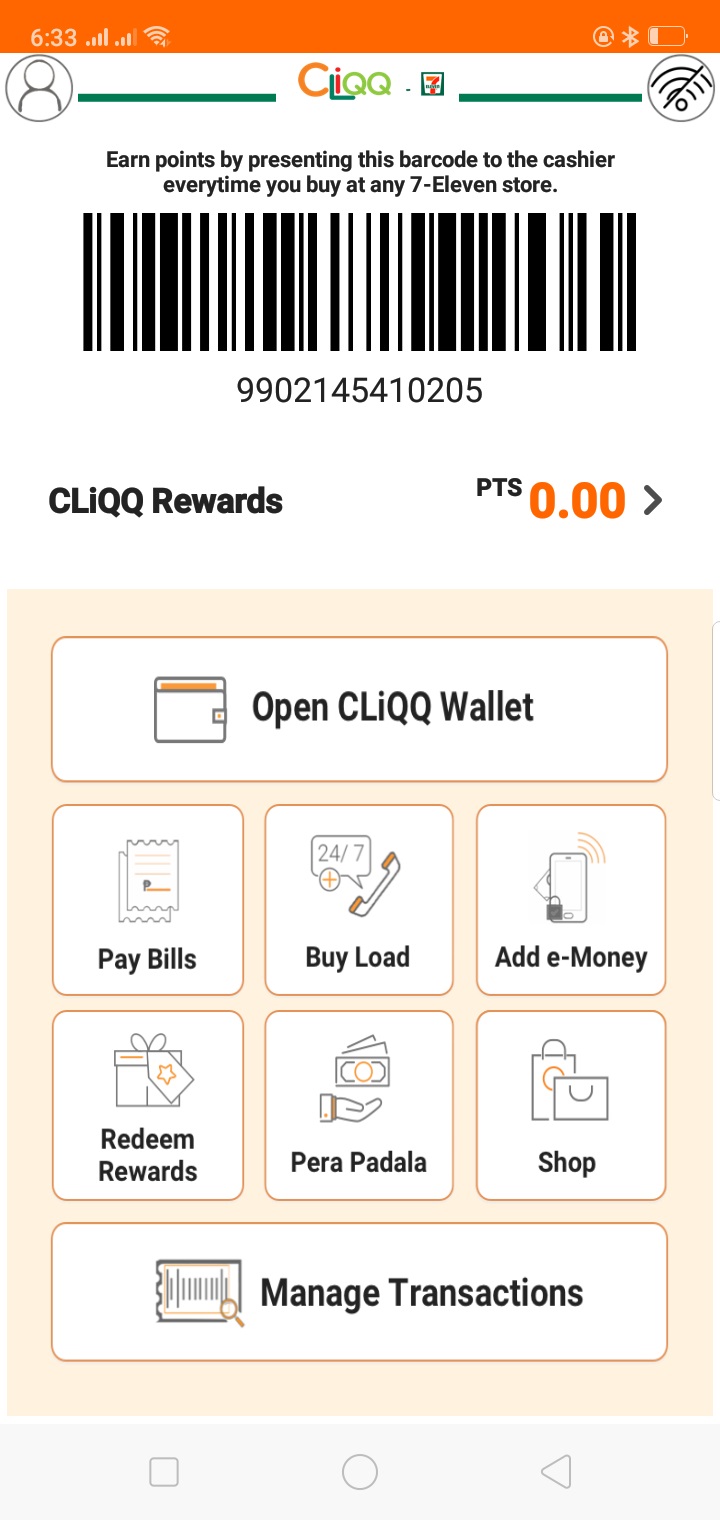
Since you’ll only be using the CLiQQ app to pay the police clearance fee, click on Pay Bills. Wait for the app to update its list of billers before proceeding to the next step.
Step 11: Select “Government” From the List of Billers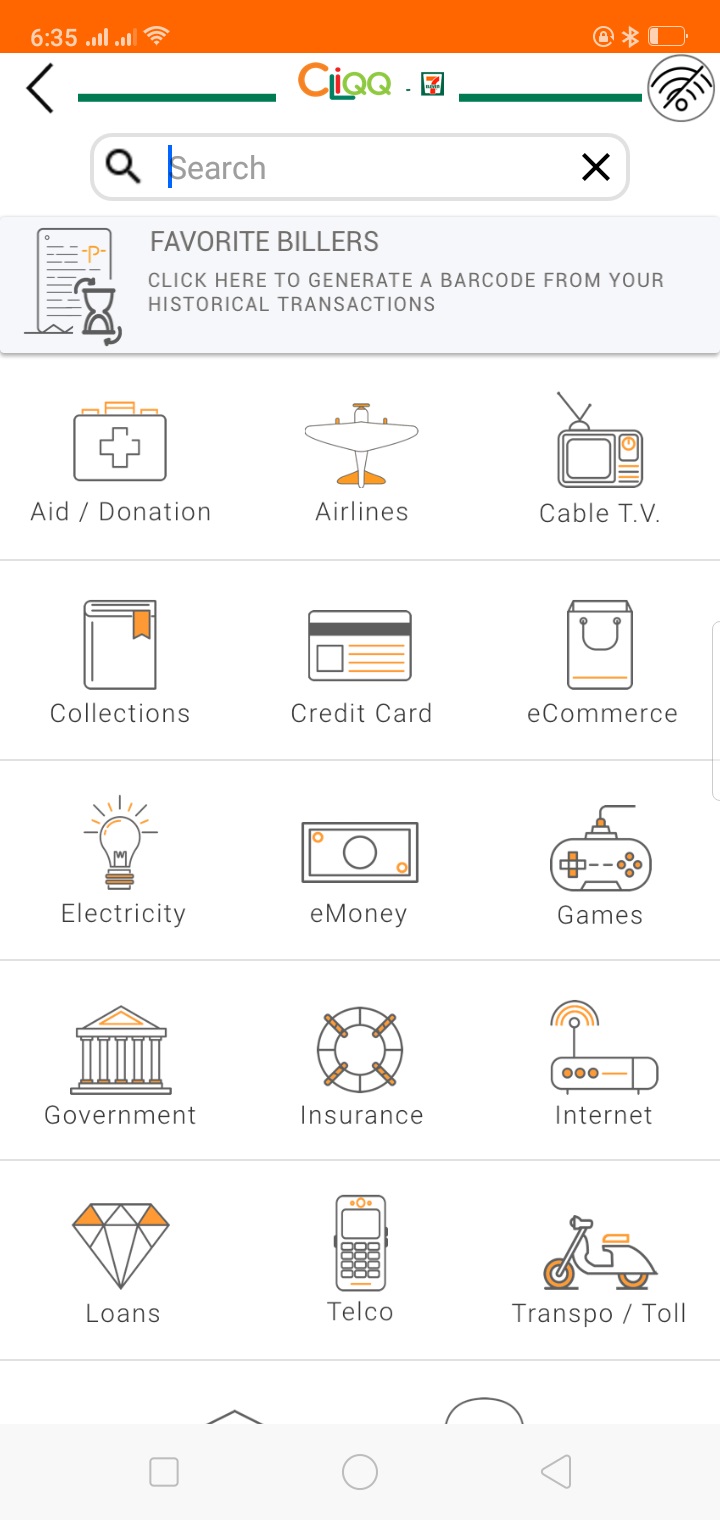
The police clearance is issued by the Philippine National Police, which is part of the local government.
Step 12: Select MYEGPH From the List of Options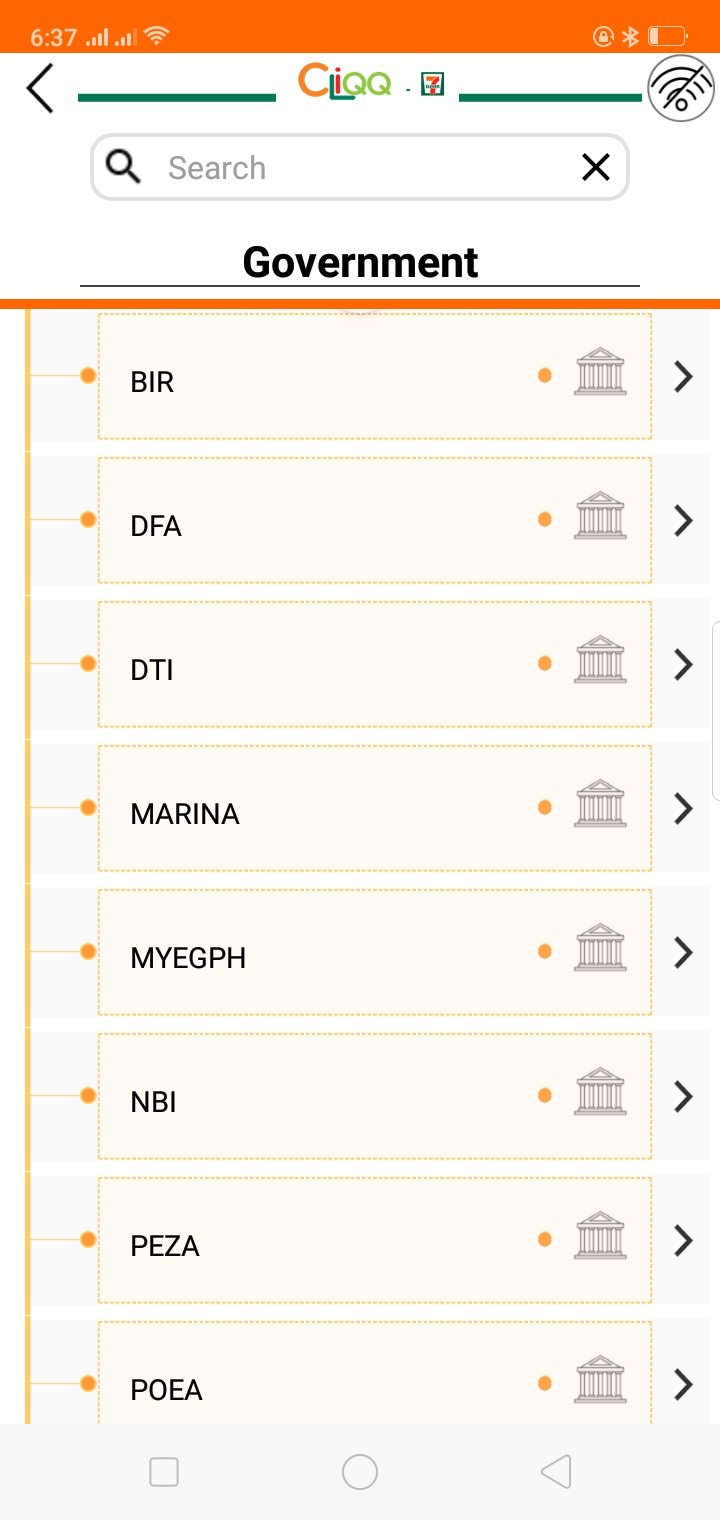
Since you secured the 7-Eleven payment reference number through the MyEG Philippines payment gateway, you should also select the same name to proceed with this transaction.
Step 13: Enter Your Payment Reference Number, Mobile Number, and Total Amount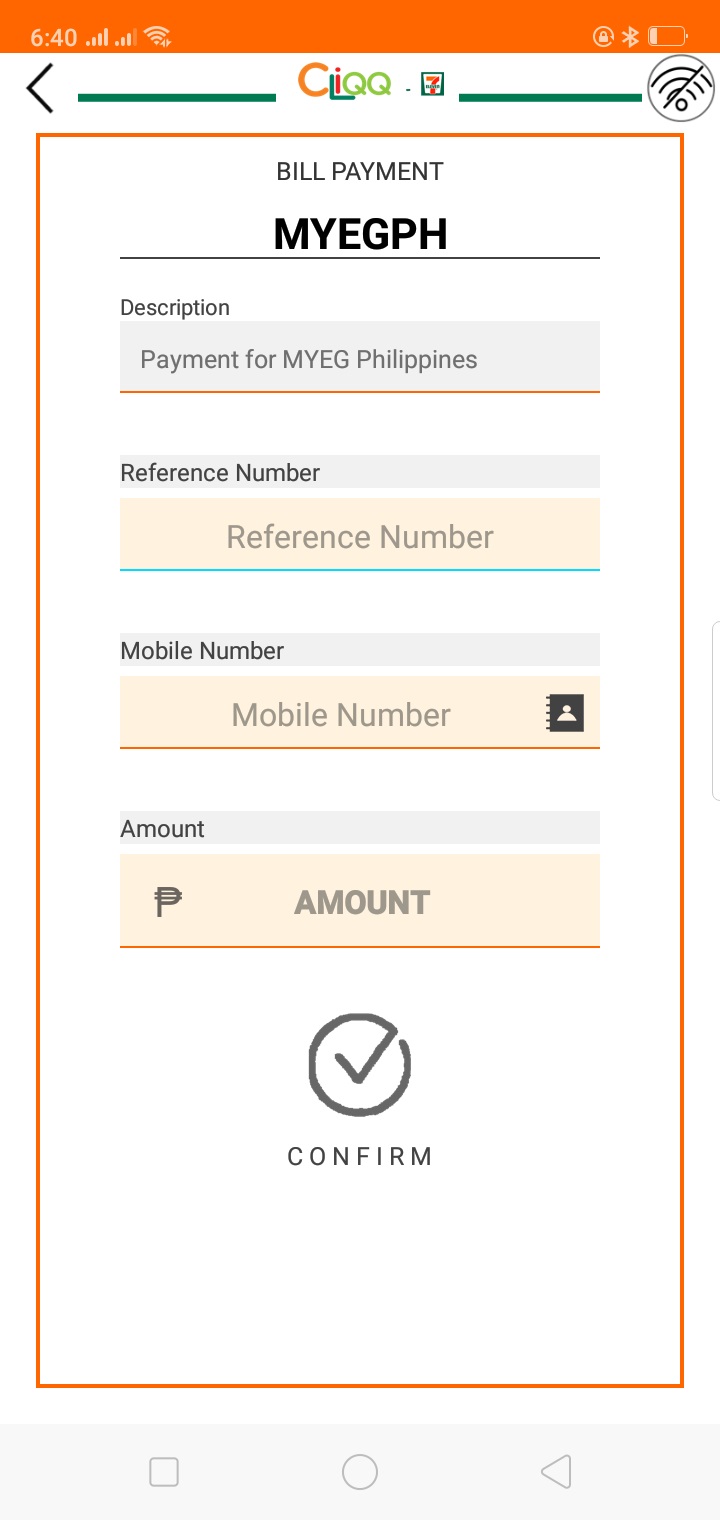
Again, the payment reference number is the 10 alphanumeric characters you obtained in step 7. The total amount is Php 180 (police clearance fee + convenience fee).
Click Confirm to complete the transaction.
Step 14: Proceed to the Nearest 7-Eleven Convenience Store To Make the Payment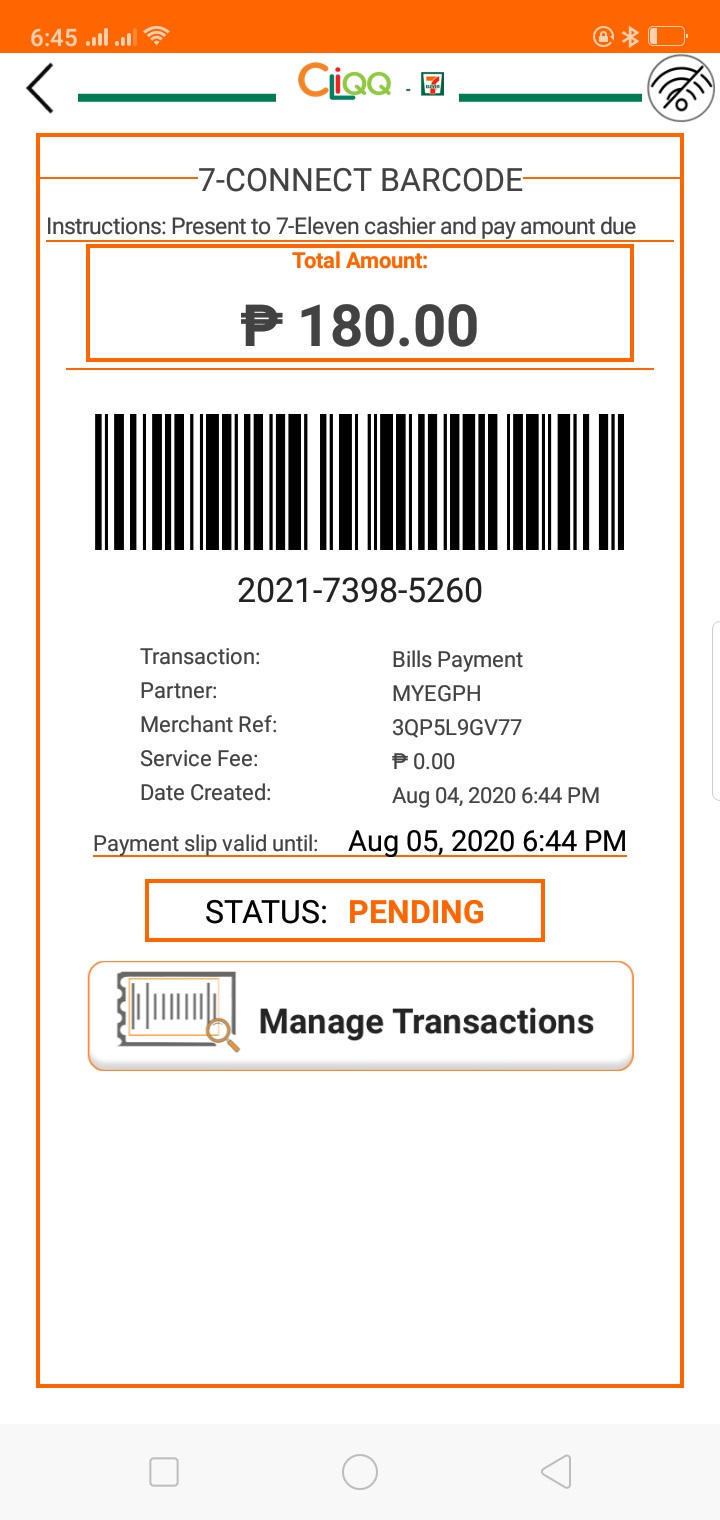
To pay, open your CLiQQ app, go to Manage Transactions, and select the Bills Payment tab. Click the pending transaction you created to show the barcode needed for the police clearance payment.
Present this bar code (see the screenshot below) to the cashier and pay the amount due.
After the payment is complete, don’t forget to keep the receipt issued by 7-Eleven as proof of payment.
On the day of your appointment, you must present this receipt with 2 valid IDs, the email address you used to make the online appointment, and the reference number, as shown in step 3 above.
That’s it! Now you know how to pay the police clearance via 7-Eleven.
References
- Aranda, C. (2020). Police clearance for visas. Retrieved 4 August 2020, from https://www.manilatimes.net/2020/07/27/opinion/columnists/police-clearance-for-visas/746355/
- How to get a police certificate – Philippines. (2018). Retrieved 4 August 2020, from https://www.canada.ca/en/immigration-refugees-citizenship/services/application/medical-police/police-certificates/how/philippines.html
- Cigaral, i. (2019). The PNP will have a National Police Clearance System in October. Here’s what you need to know. | Philstar.com. Retrieved 4 October 2019, from https://www.philstar.com/business/2019/09/26/1955155/pnp-will-have-national-police-clearance-system-october-heres-what-you-need-know
- Recuenco, A. (2022, December 05). PNP earns over P619m from National Police Clearance System. Retrieved January 16, 2023, from https://mb.com.ph/2022/12/05/pnp-earns-over-p619m-from-national-police-clearance-system/
- Talabong, R. (2019). How the PNP plans to replace the NBI clearance with their own. Retrieved 4 October 2019, from https://www.rappler.com/newsbreak/iq/226009-how-pnp-plans-replace-nbi-clearance-with-own
- Official Gazette of the Republic of the Philippines. First Time Jobseekers Assistance Act (2018).
- Recuenco, A. (2020). Police clearance application available in SM malls soon. Retrieved 15 October 2020, from https://mb.com.ph/2020/09/28/police-clearance-application-available-in-sm-malls-soon/
- DOLE issues rules on free documentary requirements for first time jobseekers. (2019). Retrieved 20 July 2020, from https://www.dole.gov.ph/dole-issues-rules-on-free-documentary-requirements-for-first-time-jobseekers/
- Revised Penal Code of the Philippines, Article 172
- Aranda, C. (2020). Police clearance for visas. Retrieved 4 August 2020, from https://www.manilatimes.net/2020/07/27/opinion/columnists/police-clearance-for-visas/746355/
- How to get a police certificate – Philippines. (2018). Retrieved 4 August 2020, from https://www.canada.ca/en/immigration-refugees-citizenship/services/application/medical-police/police-certificates/how/philippines.html
Luisito Batongbakal Jr.
Luisito E. Batongbakal Jr. is the founder, editor, and chief content strategist of FilipiKnow, a leading online portal for free educational, Filipino-centric content. His curiosity and passion for learning have helped millions of Filipinos around the world get access to free insightful and practical information at the touch of their fingertips. With him at the helm, FilipiKnow has won numerous awards including the Top 10 Emerging Influential Blogs 2013, the 2015 Globe Tatt Awards, and the 2015 Philippine Bloggys Awards.
Copyright Notice
All materials contained on this site are protected by the Republic of the Philippines copyright law and may not be reproduced, distributed, transmitted, displayed, published, or broadcast without the prior written permission of filipiknow.net or in the case of third party materials, the owner of that content. You may not alter or remove any trademark, copyright, or other notice from copies of the content. Be warned that we have already reported and helped terminate several websites and YouTube channels for blatantly stealing our content. If you wish to use filipiknow.net content for commercial purposes, such as for content syndication, etc., please contact us at legal(at)filipiknow(dot)net
